




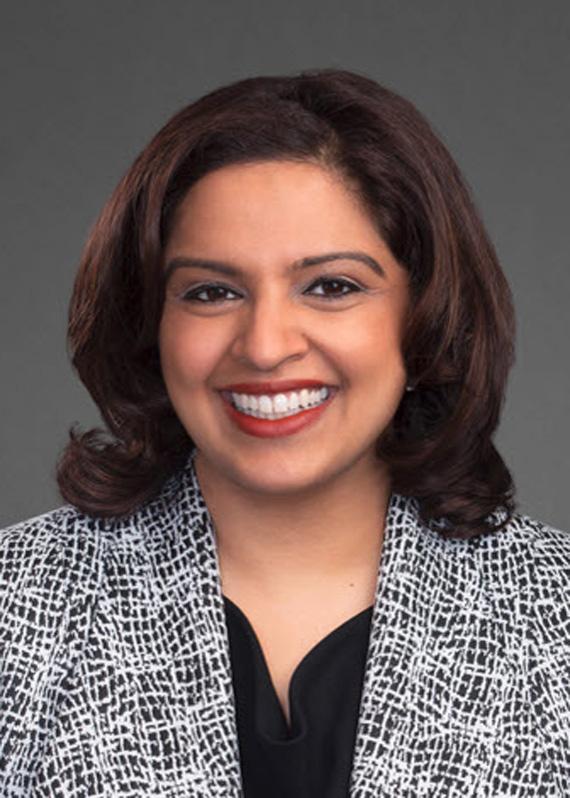
It has been a deep honor and an absolute pleasure to serve as MWL President for FY 2023-24. It has been a year of tremendous professional and personal development and one happily marked with exponential growth in my community connections. I have enjoyed all aspects of this leadership role, but most importantly I have enjoyed connecting with members. We have a very engaged, driven, varied membership and it is fulfilling to connect with them on a personal and collective level.
In the last issue of With Equal Right, I introduced a theme for my presidential year “Finding and Using your Voice”. In that issue, I built my article around considerations to keep in mind as you find your voice. After nearly seventeen years in the professional workforce, I can say that finding your voice in any organization is equated to articulating your value to that organization. You can have a voice in the decision making if you are able to articulate the value you bring to the table. In my opinion, the value we bring to our organizations is multidimensional and multifaceted. It is a combination of our personal and professional experiences, learnings and often mistakes we have made. In addition, I believe that our value should be articulated through the lens of our stakeholders. It is important to distill how our contributions relate to and matter to the organization’s larger mission and goals. Therefore, in the winter issue I examined considerations for the critical work of articulating value and framing it in terms of not only what is important to stakeholders but also to ourselves.
In this article I will focus on how best to message one’s value. Simply put, while I discussed the “what” are you communicating in my previous article, in this article I will discuss the “who”, “where”, and “when” of that communication.
In the same way we know good work alone is not sufficient, crystalizing your high value to the organization is not sufficient if you do not communicate it. We need to learn how best to message and communicate our value. The most common instances where we are asked to communicate our value is at the time we are seeking a pay raise, a promotion or similar career advancement. I offer the considerations below on communicating your value at these critical junctures and hope these are helpful if you are looking to engage in these discussions.
First, create an unapologetic brag file that includes specific examples to demonstrate how you exceeded expectations over a relevant time period. One easy way to think about the brag file is to create track record (preferably documented) of your accomplishments. A track record is a wonderful tool not just to track and record of achievements and contributions but can also aid in organizing and positioning them in a way to present it to the organization. One of my colleagues at work keeps a journal to document every transaction or project she assisted with and her role on it. Her journal is rich with specific indisputable examples of work she has delivered. I think this is a brilliant strategy because once year-end arrives, it is easy to forget what you did in Q1 of the year, and it is even easier for others on your team to forget what you have done. Keeping a journal or brag file is therefore incredibly helpful in capturing our contributions and being able to refer to them.
Second, understand who needs to know your value. Our value should be messaged to a combination of stakeholders, not just one person. In my experience, office promotions and salary decisions are almost always made by more than one person (most likely a committee of individuals), so it is critical to frame your message about your value in
terms of what is important to the collective group of people who are evaluating you.
Third, be forward facing. While a brag file is helpful to support discussions about the value you have delivered in the past, be prepared to talk about your future potential as well. Your message needs to include how your promotion or salary increase helps drive the organization forward and closer to its mission and goals. It took me a while to learn that promotion decisions are not often linear and unlike law firms, there may not be a clear path to advancement everywhere. Many organizations and departments grow, change, and evolve over time and so could promotion criteria. So, it is important to be aware of the changing landscape and be willing to adjust your message accordingly.
Fourth, like everything in life, timing is important. When you decide to have this conversation, be sure you have previewed it with your stakeholders. There may never be a perfect time but do it at least when you have their attention, maybe in a one-on-one meeting, performance review or after a recent big win. I had a junior team member once approach me in an elevator to talk about the feedback I had provided in his review. It was the most uncomfortable and ineffective conversation I have had. Instead, I wish he had previewed his concerns in the elevator and then proceeded to set up a meeting. Another tip, never waste a one-on-one with your stakeholders thinking you are not fully ready to have a conversation about an ask. I recently read that fear of doing something in your professional life is not unique to you. This fear should be experienced and examined but not be allowed to paralyze us. Get comfortable with doing things while you are still afraid. Do it afraid. Have the conversation even if it means you are shaking inside.
And finally, approach a conversation about your ask as an open dialogue with a healthy dose of curiosity and not entitlement. You want your discussion of value to be a conversation and not a question about when you can get a raise or a promotion. Choose your words wisely so you come across as looking to start a conversation and not seeking a detailed road map. Something such as “I am excited about the experience I have gained on this job,” “I have grown in many ways here,” or “I am excited to know my future potential here”. My personal favorite is “ what are your thoughts on my advancement?”. The beauty of this approach is that it benefits both you, and the organization. It provides an opportunity for our stakeholders to be part of a collaborative discussion, and they can be on your side when advocating for you. It is also best not leave these conversations open ended. Most decisions related to salary increase or promotion take time, often weeks or months. Be sure to ask what timeline you should expect and then follow-up accordingly.
I firmly believe that articulating and communicating your value are both required to succeed in an organization. And like any other life skill- they need practice to develop. Once we are comfortable doing this for ourselves, we can do it more effectively for others – not just communicating our value but the value of those in our community, so we can be each other’s voice in a way that matters.
I am excited for what lies ahead for MWL under incoming President Emerald Gratz’s leadership. As we forge MWL’s future together, we can find and use our voice for those who need it.
Thank you for the incredible experience to lead you. And see you soon!
ABOUT POONAM KUMAR: Poonam serves as MWL’s FY23-24 President. She is a partner in the corporate practice at DLA Piper LLP (a large global law firm) and is based in their Minneapolis office. She is a representative for DLA Piper’s Leadership Alliance for Women and previously served as a co-chair of Mosaic, DLA’s affinity group for diverse partners and counsel. Twin Cities, Poonam also serves on the Advisory Board for South Asian Women’s Network. Learn more about Poonam at www.mwlawyers.org/FromthePresident
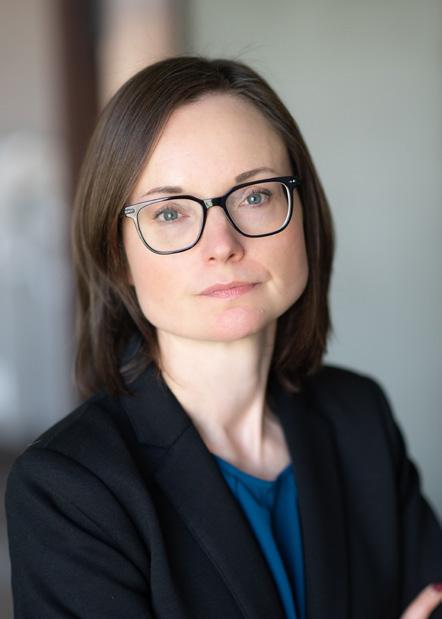
MWL FY24-25 President
It is such an honor to be the next president of Minnesota Women Lawyers (MWL). I joined this organization in 2002 as a 1L law student and my reason for joining was simple – I wanted to meet and learn from women lawyers in the local legal community. But such a simple premise has developed into a meaningful lifelong relationship with MWL. Over the past 22 years, I have contributed in various ways to the organization. I have participated in the Book Club and Professional Parents Affinity Groups. I am a founding member of the St. Croix Valley Chapter. I have served as a member of the task force that developed the 2015-2019 strategic plan and then restructured the organization in accordance with that plan. I have been a member of the awards and nominating committees. I have co-chaired the Programming Committee, the CLE-MMM Committee, and the Leadership Development Committee. In 2022, I was honored to receive the Service to MWL Award along with Theresa Johnson for our efforts in launching the current MWL Leadership Institute. I have served two terms on the MWL Board of Directors and spent the last three years on the Executive Committee serving as the MWL Secretary, Treasurer, and President-Elect. But no matter how much I give, I have always received so much more in return.
Looking ahead to my presidential year, the theme I have selected is Forging MWL’s Future. In my view, now is the time for MWL to recalibrate to the new normal and plan for the future. By concentrating on the three core values of equity, leadership, and community, I believe MWL will continue to prosper for another 50 years.
According to recent data, 56% of law students are women and 86% of law schools report having more female than male law students, including 18 of the top 20 law schoolsi. While these statistics are cause for celebration, the progress in educating women lawyers does not translate into equivalent advancements in leadership roles within the profession. One focus for Forging MWL’s Future is an emphasis on the MWL core value of leadership. How can we translate the increased number of female law students and women entering the profession to an increased number of women attorneys in leadership roles in every type of legal organization? Where has the leadership pipeline been disconnected and how can that be remedied? I am thinking about and seeking input on the types of support and programs can be offered to women lawyers to foster and achieve leadership roles.
Despite the increase in the numbers of female law students, the same type of progress does not exist for women of color attorneys. According to recent data, the number of lawyers of color has grown less than 3 percentage points in the past 10 yearsii. White men and white women are still overrepresented in the legal profession compared with their presence in the overall population of this country. And for the first time since 2017, the percentage of summer associates of color at law firms declined in 2023iii. It is a well-known fact that the diversity of each year’s summer associate class at law firms provides the leadership pipeline for increasing diversity among law firm partners. Another focus for Forging MWL’s Future is an emphasis on the MWL core value of community. How can we create and maintain a diverse community
i Ian Pisarcik, Women Outnumber Men in US Law School Classrooms, but Statistics Don’t Tell the Full Story, JURIST NEWS, Jan. 17, 2024, https://www.jurist.org/commentary/2024/01/women-outnumber-men-in-us-law-school-classrooms-but-statistics-dont-tellthe-full-story/.
ii ABA Profile of the Legal Profession 2020, https://www.americanbar.org/content/dam/ aba/administrative/news/2020/07/potlp2020.pdf.
iii NALP 2023 Report on Diversity in U.S. Law Firms, https://www.nalp.org/uploads/Researc h/2023NALPReportonDiversityFinal.pdf.
of women of color attorneys within this organization and the local legal community? The creation of the MWL Black Women Attorneys Affinity Group during the past year is a good start, but there is more work to be done. I am thinking about and seeking input on what types of support and programs can be offered to women of color lawyers to help them achieve parity.
Finally, the issue of equal pay for women lawyers persists. According to recent data, female associates in law firms are paid on average 91% of what their male counterparts earn, and female equity partners average only 85% compensation of male equity partnersiv. Why? Another focus for Forging MWL’s Future is an emphasis on the MWL core value of equity. What is it going to take to achieve pay equity between male and female lawyers in the profession and how do we get there?
In closing, it is such an incredible honor to take the helm of the MWL mothership and continue steering the organization toward a bright future. It will take our entire community, from law students to experienced attorneys, from legal employers to public entities, to make an impact. I hope you will join me in Forging MWL’s Future.
iv Lori Andrus, Big Law Beware: Women Lawyers Have Had Enough of Unequal Pay, BLOOMBERG LAW, June 9, 2022, https://news.bloomberglaw.com/business-and-practice/ big-law-beware-women-lawyers-have-had-enough-of-unequal-pay.
ABOUT EMERALD GRATZ: Emerald will serve as MWL’s FY24-25 President. Emerald Gratz became Associate General Counsel of the Minnesota Department of Public Safety in November 2023. Prior to joining the Department of Public Safety, she was an Assistant Commissioner of the Minnesota Supreme Court, a staff attorney and mediator at the Minnesota Office of Administrative Hearings, an Assistant Attorney General at the Minnesota Attorney General’s Office, and a law clerk in United States District Court for the District of Minnesota. Ms. Gratz spent five years teaching appellate advocacy as an adjunct instructor at the University of Minnesota Law School and providing pro bono representation to women and children through the Tubman Safety Project and the Children’s Law Center. She is an active member of Minnesota Women Lawyers and will serve as MWL President for FY2024-25. She is also a member of the University of Minnesota Law School Board of Advisors and serves on the board’s academic engagement committee. Ms. Gratz has received several professional awards, including the 2022 Service to Minnesota Women Lawyers Award, the 2011 Public Service Award from the Minnesota County Attorney’s Association, and the 2009 All-Star Prosecutor Award from the Minnesota Office of Traffic Safety. She graduated from Hamline University in 2002, the University of Minnesota Law School in 2005, and is admitted to practice law in Minnesota state and federal district courts. The full details of her professional background can be found at www.linkedin.com/in/emeraldgratz/.
By Justice Margaret Chutich
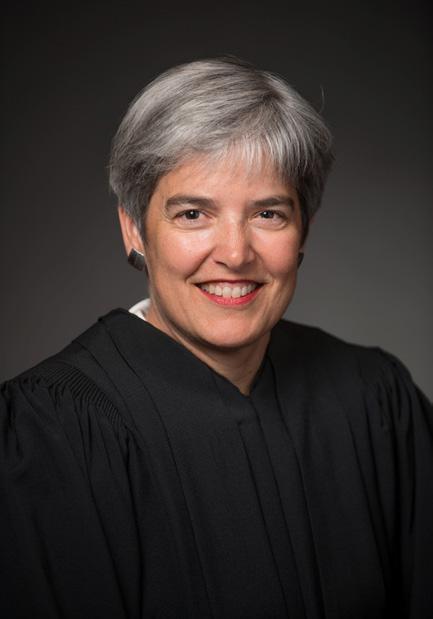
As my time on the bench comes to a close, I have been reflecting on the progress that women have made in the legal field, particularly in the state court system, since I joined the bar, and why this progress matters. When I entered Michigan Law School in 1981, only one-third of the class members were women, and I did not attend a single course there that was taught by a woman professor. Female legal role models were scarce. Fortunately, right after graduation, I found an incredible role model and mentor when the Honorable Diana E. Murphy hired me for a two-year clerkship. In 1980, Judge Murphy had placed a major crack in the glass ceiling confining women lawyers by becoming the first woman to sit as a United States district judge for the District of Minnesota. I know that Judge Murphy faced some early skepticism from male litigators about her ability to do such a demanding job. I recall one big-time trial lawyer telling me, when talking about a motion pending before the Judge, that he hoped that “you girls will figure it out.”
Judge Murphy handled the pressure of being the “first” with grace, just as she managed the many other firsts that were to follow. She proved the doubters wrong through her hard work, keen intelligence, scrupulous fairness, and concise writing. And I had the invaluable opportunity of seeing first-hand how an excellent judge carries out her duties. Under her tutelage, I blossomed from being a new clerk who hesitated to even include a recommendation in her memos to the Judge, to becoming a more confident and capable lawyer. I am forever grateful to the Judge for showing me and countless other women that a path in the judiciary existed for us and could be successfully navigated.
Around the time I started private practice in 1986, the Minnesota Supreme Court created a task force to promote gender fairness in the courts. Led by Justice Rosalie Wahl, the first woman appointed to the Court in 1977, the Task Force examined family law, domestic violence, criminal and civil justice, and the courtroom environment to evaluate how gender bias affected the Minnesota court system. In its final report in 1989, the Task Force reported that only 12 percent of Minnesota state court judges were women. Although the raw numbers were disheartening, the anecdotes shared about women judges were simply dumbfounding. The Task Force quoted comments made at meetings and public hearings about the prospect of more women serving on the bench. The comments included “screw the women,” “we don’t need any more g-d-damned skirts around here,” and “what would we do when she is premenstrual?” These comments were made in public; one wonders what was said behind closed doors.
Despite the negative stereotypes and fears held by some, Minnesota proved to be a trailblazing state for women judges. In 1991, Minnesota became the first state with a female majority on its highest court. I still remember the thrill that I experienced when, as a new lawyer, I made my first appearance before that Court. When I entered the courtroom, with four female members on the bench, I had confidence that I too belonged there. I knew that my gender would be no barrier, that I wouldn’t be dismissed as a “lawyerette,” which I was once called, or underestimated because I was a woman. I knew that my argument would be heard, taken seriously, and carefully considered.
Since that first gender-balanced court, Minnesota has continued to make gender-equity progress in our state courts. I’m pleased to report that, in 2023, all three levels of our state courts—the Supreme Court, the 19-member Court of Appeals, and district court system with its
294 judges—had a majority of female judges: 54 percent of them were women. Moreover, women are leading these courts. Today the Supreme Court and the Court of Appeals have chiefs who are women, and five of the 10 judicial districts in Minnesota have women chief judges. By comparison, nationally, only 34 percent of state court judges were women in 2023. And on our Eighth Circuit Court of Appeals, to this very day, only two women out of some 63 judges—the first being my mentor Diana E. Murphy—have served on that powerful court. That gender imbalance is unconscionable.
I celebrate the gender balance on Minnesota’s state courts because it matters. It matters for women appearing in court to see that some of the decision makers look like them. Just as when I appeared before that first female majority supreme court, female litigants appearing in front of women judges may also have increased confidence that they will be taken seriously in court, that they will be seen and heard. They may also hope that the women judges have similar life experiences that will help the judge apply the law to the facts in a fair fashion.
To be sure, the life experiences of women judges do not dictate a legal result—the applicable law does that. And we all know that women are not a monolithic group and do not experience the world or think about any one issue in the same way. But the life experiences that women judges bring to the bench are key to enriching the understanding of the courts about the facts involved in particular cases. I’ve focused here on why the presence of women judges matters, but I know the importance of a balanced judiciary in general. Certainly, the life experiences of my male colleagues have often informed my thinking, causing me to assess a situation differently than when I first viewed it. Similarly, I believe that all types of diversity in decision makers—gender, race, religion, sexual orientation, disability, geographic, socioeconomic, and age diversity—help to create a fair system of justice and increase confidence and trust in the courts by the people we serve.
As my retirement approaches, I am filled with many emotions. But mostly I am buoyed by gratitude. I am grateful that Judge Murphy had the fortitude and perseverance to be the “first” more than once, showing women lawyers that we belong on the bench at every level. I am grateful that I had the chance to serve on a court with other justices who bring diverse life experiences to our collective discussions as we strive to apply the law as fairly and impartially as we can. I am also grateful for the many opportunities that I have had to mentor new lawyers, particularly my many superb, diligent law clerks. And perhaps, just as Judge Murphy did for me, my being a “first”—the first open member of the LGBTQ+ community to serve on the Supreme Court— will serve as an inspiration to others. I look forward to the day that every lawyer sees themselves reflected on the bench—when there are no more “firsts,” only the next, and the next, and the next.
Justice Chutich gratefully acknowledges the collaboration of Mary Clare Mulcahy, a former law clerk and current associate at Nichols Kaster, PLLP, in crafting this article.
ABOUT JUSTICE MARGARET CHUTICH: Justice Margaret Chutich served as an associate justice of the Minnesota Supreme Court since 2016, when she was appointed by Governor Mark Dayton. She previously served as a judge on the Minnesota Court of Appeals.
Chutich worked in the office of the Minnesota Attorney General and as an Assistant U.S. Attorney for the District of Minnesota. In 2008, she was appointed assistant dean of the Humphrey School of Public Affairs at the University of Minnesota. In 2011, Dayton appointed her to the appeals court.
Chutich is a graduate of Anoka High School, the University of Minnesota, and Michigan Law. She is the first openly gay justice on the Minnesota Supreme Court. She will retire on July 31, 2024.
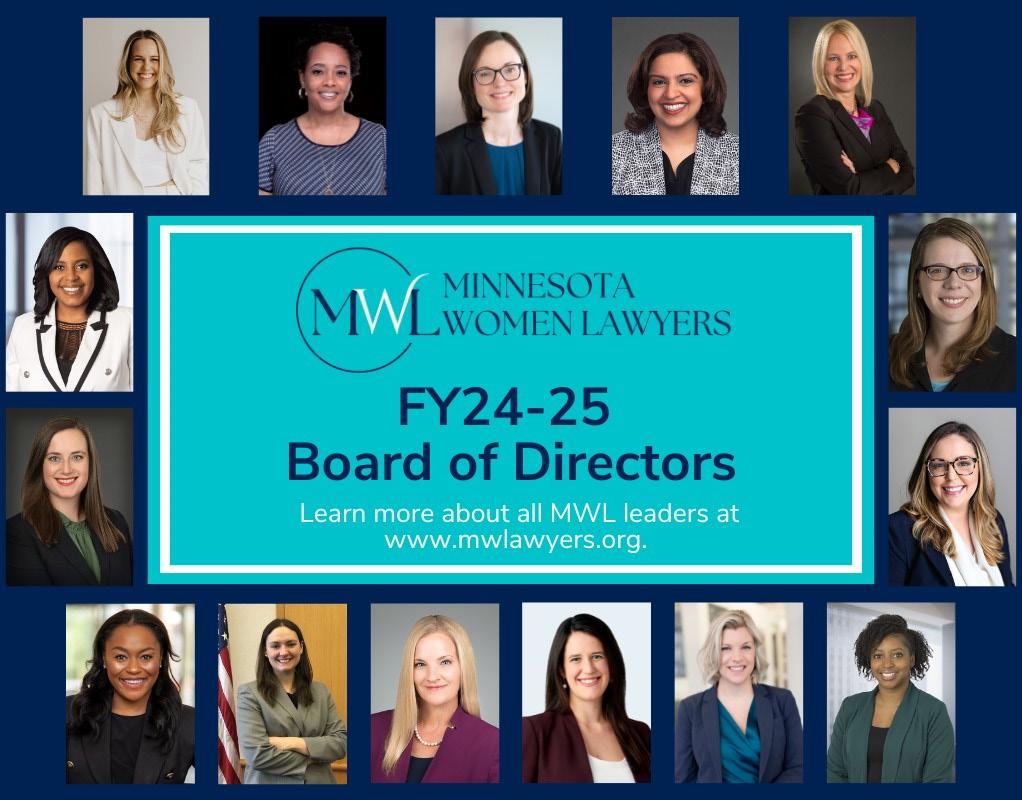
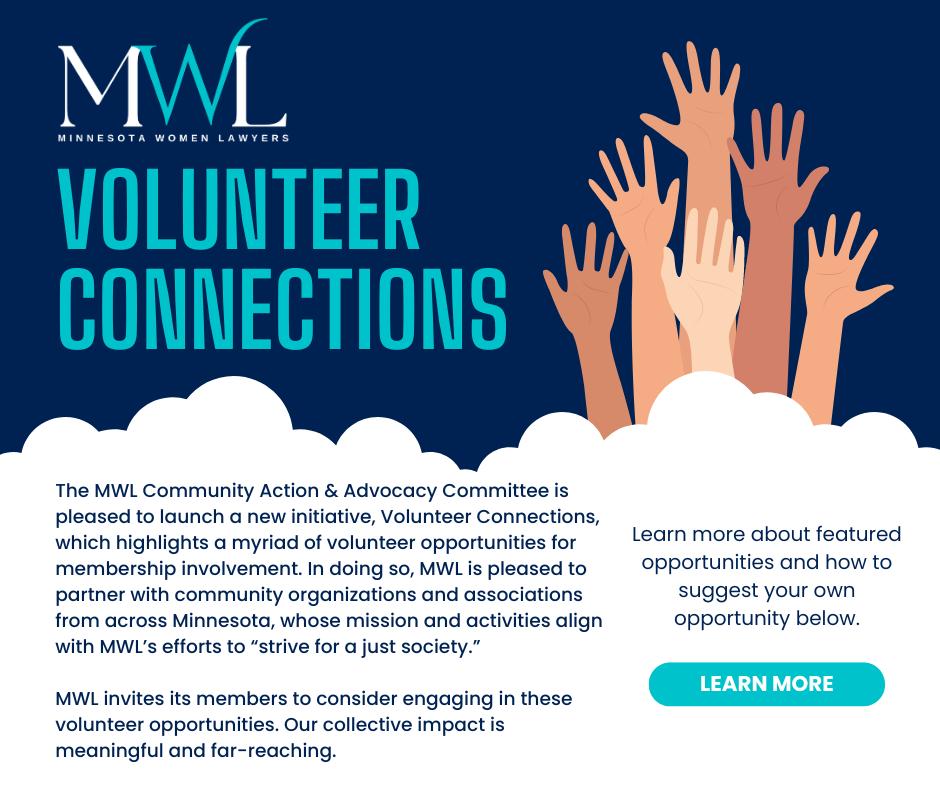
President
Emerald Gratz, Minnesota Department of Public Safety
President-Elect
Dionne Blake, Target Corporation
Secretary
Molly Hough, Prime Therapeutics
Treasurer
Karen Opp, Korn Ferry
Past-President
Poonam Kumar, DLA Piper LLP
Board Directors
Deborah Autrey, Nilan Johnson Lewis PA
Laura Bartlow, Zelle LLP
Cody Blades, Parker Daniels Kibort, LLC
Amy Boyle, MSB Employment Justice
Allison Cole, Chestnut Cambronne PA
Kelsey Kelley, Anoka County Attorney’s Office
Kristen Larson, Ballard Spahr LLP
Virginia McCalmont, Forsgren Fisher McCalmont DeMarea Tysver LLP
Cassie Merrick, MADEL PA
Maliya Rattliffe, Fredrikson & Byron, P.A.
Chapter Liaisons
Central Chapter
Heidi Hovis, Minnesota Department of Human Rights
St. Croix Valley Chapter
Amy Schmidt, Campbell Knutson, P.A.
Northeastern Chapter
Linda Tabory, Tabory Law LLC
South Central Chapter
Open
Law Student Liaisons
Mitchell Hamline School of Law
Mariah Marks Erickson
University of Minnesota Law School
Ally Diwik
University of St. Thomas School of Law
Monali Bhakta
Staff
Debra Pexa, Executive Director
Katie Gunaratne, Membership & Communications Coordinator
Tessa Jones, Program & Projects Coordinator
By Christine B. Courtney
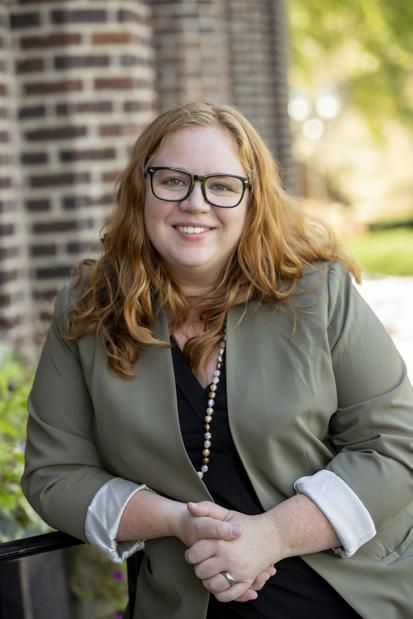
Christine B. Courtney
As young women, we go to law school because we want to be Sandra Day O’Connor, Sonia Sotomayor, Loretta Lynch, and Constance Baker Motley—or maybe Judith Susan Sheindlin or Ally McBeal. We work hard. We get that law degree. We work those grueling, demanding, and sometimes dehumanizing postlaw school jobs: too-high billable hourly requirements, a complete lack of flexibility, bosses that belittle and yell, complex and terrifying office politics, last-minute demands which translate into all-night work, and the stakes for our clients can be so high, don’t mess up—but there is a goal, and an end in sight. The goal: Learn. Excel. Pick your own cases. Bring in your own clients. Make partner, move up in the organization, start your own firm, better salary, better benefits, become a judge, become a justice.
Then the other problems come. The problems we don’t want to talk about, the problems that we are warned by our mothers not to talk in front of our professional acquaintances, the problems that don’t happen to the TV lawyers. We have sick kids and can’t bring them to daycare or work. A complex pregnancy with mandated bedrest, and then a needed maternity leave. Summer camp drops offs and pickups that take a spreadsheet and degree in calendaring to understand. A parent gets cancer—or dementia—requiring serious long-term care, and there is a long waitlist for professional care. A close family member dies, and we need time to grieve.
And then, we—the firms, the county offices, the profession itself— hemorrhage lawyers. We lose talented, motivated, capable lawyers to these everyday, real-life situations. In particular, we lose women lawyers. We know these lawyers: they are our friends from law school, our work-spouses from our first jobs, our referral partners. We know that they were let go because they were unable to meet those billable requirements when they had to care for their dad. We know that they left the firm to take a maternity leave, and could see how unfriendly the return to work would be. We know that sometimes, the Court— and their employers, the firms—do not permit lawyers to take time off to take care of themselves and their families, no matter how reasonable the request. We know that sometimes, we really shouldn’t even ask for that time. Because of this, we have seen our friends and colleagues leave our profession, and it wasn’t because they were not capable, excellent attorneys.
This is a big, visible problem. But this problem—the attrition of attorneys to the many demands of our human lives—can have many, small solutions. I have good news: a report of progress, on one specific part of this issue.
In the summer of 2020, the MSBA convened a working group of attorneys and judges to draft amendments to the Minnesota Rules. The amendments allow attorneys to request a continuance of a court proceeding, for a 90 day presumptive personal leave, for attorneys who meet certain requirements—such as a serious health condition, the birth or adoption of a child, or the need to care for a household member who has a serious health condition. The MSBA filed the Petition with the Court proposing those amendments in 2022. On April 30, 2024, the Court adopted those provisions on a two-year pilot project basis.
Beginning on September 1, 2024, Minnesota Rule of General Practice 18, and Minnesota Rule of Civil Appellate Procedure 126.03, are in effect for the two-year pilot project. This won’t solve how our profession
loses capable attorneys for a lack of flexibility and realistic personal and professional boundaries. The purpose was not to solve all of these problems, but to tackle one part of it: allowing attorneys to obtain a continuance on an active Court case, with their client’s consent, without placing their own (and their families’) personal medical details on their client’s court record, and without relying on the mercy of opposing counsel and their interpretation of the word “zealous”.
This rule will allow a pregnant lawyer to take a maternity leave while still having active cases in the Court system, and maintain her cases before and after her leave—rather than losing the case, the client relationship, and the credit to another lawyer at the firm. This rule allows litigators, who lose a parent or another loved one, to unexpectedly take two weeks off to plan the funeral and grieve, rather than fight through the loss to show up in Court and conduct a trial. This rule allows a lawyer with a non-emergency court proceeding to delay that proceeding when their elderly parent has a sudden fall and needs their assistance navigating the hospital and transition to the long-term care facility for those crucial initial weeks.
Our profession will always struggle with balancing the needs of the human lawyers against the interests of justice. Clients have a right to a fair and speedy resolution of their matter, and a right to be protected against abuse of this new personal continuance system. For that reason, there is a built-in process to challenge the continuance request. Additionally, this system cannot be used in all cases, and safeguards against impairing a substantial right of the client when alternative arrangements can be made. Of course—attorneys can always work with co-counsel and substitute counsel rather than request a continuance.
The profession of law is a demanding profession. Sometimes, we must put the needs of our clients above our own and above our families. However, there are times when both the client and attorney can agree that a personal leave continuance is in the best interest of the client. The client often would prefer a delay to transitioning the case to another attorney. This new tool—the ability to preserve an attorney’s caseload, their relationship with their client, and their dignity—is a small but crucial step to helping women attorneys in particular remain and advance in their chosen profession.
Here's to keeping more of us in this profession, together.
ABOUT CHRISTINE B. COURTNEY: Christine B. Courtney practices estate planning, probate, and elder law at the Courtney Law Offices in St. Paul, Minnesota. She was a member of the MSBA Parental Leave Working Group, and serves as Co-Chair of the MWL Solo/Small Practitioners Affinity Group.
By Leanne Fuith
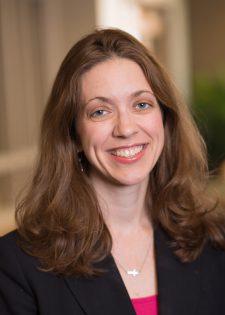
Leanne Fuith
The traditional path of legal practice is no longer the sole career choice for lawyers, especially for women and women-identified lawyers seeking to leverage their legal education and skills in diverse and meaningful ways. JD Advantage roles have emerged as compelling alternatives that create a bridge between legal expertise and industries where skills such as analytical thinking, strategic planning, and regulatory understanding are highly valued.
According to the National Association of Law Placement and the American Bar Association, JD Advantage roles are those for which an employer sought an individual with a Juris Doctor degree or for which the Juris Doctor degree provided a demonstrable advantage. JD Advantage roles do not require bar passage, an active law license, or involve practicing law.
JD Advantage roles capitalize on the skills and knowledge gained through legal education and experience without requiring active practice as an attorney. This opens doors to a wide array of career opportunities across sectors such as healthcare, business, technology, government relations, compliance, non-profit leadership, academia, and more.
In healthcare administration, for example, lawyers with legal expertise in healthcare regulations and patient rights may play pivotal roles as advocates for ethical standards and champions of patient-centric care, ensuring that organizational practices align with legal requirements while prioritizing patients.
In the technology sector, lawyers proficient in intellectual property rights and data privacy laws can serve in JD Advantage roles as guardians of corporate assets and consumer trust. Their legal training allows them to navigate complex regulatory landscapes while also fostering innovation responsibly.
In business settings, lawyers in JD Advantage roles may be helpful in navigating intricate legal frameworks, such as corporate governance, contract negotiation, and regulatory compliance and contribute to risk management and dispute resolution with a nuanced understanding of legal implications.
In government, lawyers in JD Advantage roles are often instrumental in policy analysis, legislative drafting, and regulatory affairs. They may draft informed policies that address societal needs and challenges while also ensuring that policies are implemented clearly, effectively, and in alignment with constitutional principles and public interest.
The law is interdisciplinary and constantly changing and professionals with legal training are highly sought after in JD Advantage roles to help navigate complex regulatory environments.
Tegan Vail is a Principal Data Privacy Analyst for C.H. Robinson. Tegan earned her law degree from Mitchell Hamline School of Law and moved immediately into the data privacy space after law school. At C.H. Robinson, Tegan does not practice law, but she does rely heavily on her legal training to help C.H. Robinson navigate an increasingly complex regulatory landscape.
“The biggest contribution I bring to the table in my career is my unique training that enables me to digest complex data privacy laws and regulations, which are, often times, first impression regulations. I am able to distill those principles and concepts in a way that is easy for the business to understand, and which also enables them to achieve compliance at scale in a way that enables operations instead of creating hindrances.”
Because of her legal training, Tegan is instrumental in translating legal complexities into operational advantages for her company. Rather than viewing regulatory compliance as a barrier, her expertise allows her to transform it into a strategic asset. Her legal training is uniquely valuable in helping her organization mitigate risk and positioning them as leaders in ethical business practices.
JD Advantage roles can also serve as a pathway for women and women-identified lawyers to move into leadership. These roles often value skills in negotiation, conflict resolution, and decision-making — skills inherently developed through legal training and practice. By leveraging these skills, women and women-identified lawyers can ascend to leadership positions where their unique perspective and expertise contribute to organizational success and meaningful change. Dee Baskin is the Executive Director of Loan Repayment Assistance Program of Minnesota (LRAP), a 501(c)3 nonprofit helping legal aid lawyers pay their student loans until they reach Public Service Loan Forgiveness. Dee earned her law degree from the University of Minnesota Law School. Her current role as the Executive Director of LRAP does not require her to practice law, but it does leverage key skills she gained in law school.
“They tell you that law school teaches you to think differently. And they are right. As a law student, I developed skills in strategic planning, critical thinking, communication and problem solving. Those skills have been particularly relevant and important to my role as a non-profit executive director where I collaborate with leaders in the law, business, and government to educate and advocate on behalf of Minnesota’s legal aid attorneys.”
The skills honed in law school and refined through legal practice can be particularly valuable in leadership positions which emphasize relationship building, advocacy, dispute resolution, and strategic thinking.
JD Advantage roles may also offer a different kind of flexibility than traditional legal practice which are often constrained by billable hours or the demands of litigation. JD Advantage careers may provide a better work-life integration while still tapping into the intellectual rigor and professional fulfillment that legal training affords. This flexibility may be particularly beneficial for lawyers balancing professional ambitions with personal interests or responsibilities.
JD Advantage roles can present unique opportunities for women and women-identified lawyers to leverage their legal training and skills in impactful roles that redefine what legal professionals can contribute and achieve in the broader professional landscape.
For more information and resources on JD Advantage careers, visit the National Association of Law Placement website at https://www.nalp.
ABOUT LEANNE FUITH: Leanne Fuith is dean of the Career and Professional Development at Mitchell Hamline School of Law. She previously practiced business law, employment law, and commercial and employment litigation at Laurie & Laurie. She is admitted to practice in the State of Minnesota.
By Sara Lewenstein
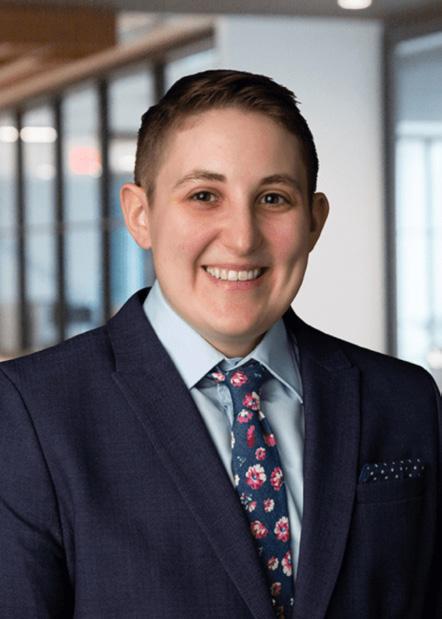
Sara Lewenstein
On June 29, 2023, the United States Supreme Court issued its opinion in Students for Fair Admissions v. President and Fellows of Harvard College and Students for Fair Admissions v. University of North Carolina (collectively SFFA).i The Supreme Court held Harvard and UNC’s consideration of race in its admissions process was unlawful under Title VI of the Civil Rights Act of 1964 (for Harvard) and the 14th Amendment (for UNC).ii Immediately after, conservative advocacy groups and republican politicians began using the SFFA decision—which on its face was limited to affirmative action in college admissions—as a herald of the end of corporate employer DEI efforts. For instance, on July 13, 2023, just weeks after the SFFA decision, a group of 13 Republican attorneys general wrote an open letter to Fortune 100 CEOs reminding them of their “obligations as an employer under federal and state law to refrain from discriminating on the basis of race, whether under the label of ‘diversity, equity, and inclusion’ or otherwise.”iii Other politicians and advocacy groups wrote similar “threat” letters, too.iv
The Practical Effect of SFFA
Since SFFA, besides simply writing threatening letters, conservative advocacy groups and individual plaintiffs have filed a rash of lawsuits targeting different aspects of employer, private foundation, and government DEI efforts. These lawsuits run the gamut, including:
• Shareholder derivative lawsuits challenging corporate DEI and LGBT initiatives.v
• Race discrimination lawsuits alleging claims under 42 U.S.C. § 1981, challenging law firm diversity fellowship programs.vi
• Lawsuits challenging the use of personal “diversity” statements in a law review application process under Title VI and in a public
i 600 U.S. ___ (2023).
ii See id.
iii https://www.tn.gov/content/dam/tn/attorneygeneral/documents/pr/2023/ pr23-27-letter.pdf.
iv See, e.g., https://www.cotton.senate.gov/news/press-releases/cottonwarns-top-law-firms-about-race-based-hiring-practices (letter by Senator Tom Cotton to 51 law firms asserting DEI programs may violate federal civil rights law); https://aflegal.org/america-first-legal-sends-warning-letter-to-big-threeaccounting-firm-stop-racial-discrimination-now/ (letter by America First Legal to PricewaterhouseCoopers LLP challenging pipeline and supplier diversity programs).
v Nat’l Ctr. for Pub. Policy Research v. Schultz, No. 2:22-CV-00267-SAB (E.D. Wash. Sep. 11, 2023) (challenging the company’s hiring goals for minorities, contracts with diverse suppliers and advertisers, and alleged practice of tying executive pay to diversity goals); Craig v. Target Corp. et al., No. 23-CV-599-JLBKCD, 2023 U.S. Dist. LEXIS 237647 (M.D. Fla. Dec. 4, 2023) (alleging the Target board falsely represented that it monitored social and political risk, when it allegedly only focused on risks associated with not achieving ESG and DEI goals, thereby allegedly depressing Target’s stock price).
vi American Alliance for Equal Rights v. Winston & Strawn LLP, No. 4:23-CV04113 (S.D. Tex. Dec. 11, 2023); American Alliance for Equal Rights v. Perkins Coie LLP, No. 3:23-CV-01877, 2023 WL 8188123 (N.D. Tex. Oct. 9, 2023); American Alliance for Equal Rights v. Morrison & Foerster LLP, No. 1:23-CV-23189 (S.D. Fla. Oct. 11, 2023); Spitalnick v. King & Spalding, LLP, No. 1:24-CV-01367-JKB (D. Md. 2024). The latter lawsuit is particularly noteworthy because the plaintiff received a reasonable cause determination from the EEOC that she was discriminated against prior to even filing suit.
university’s hiring process under the First Amendment.vii
• A challenge to a grant program providing $20,000 grants to Black female-owned small businesses under 42 U.S.C. § 1981.viii
• A challenge to race-based affinity groups under the 14th Amendment.ix
• A single plaintiff reverse race discrimination claim under Title VII alleging wrongful termination and citing the employer’s DEI initiatives as evidence of racial animus.x
• A putative federal class action lawsuit on behalf of a white plaintiff challenging Amazon’s supplier-diversity initiatives, including a program extending $10,000 grants to Amazon delivery service providers allegedly based, in part, on race.xi
• A challenge to an employer’s fellowship program, which provided minority college seniors summer internships, two years of employment post-graduation, and a scholarship, under Section 1981, Title VII, and New York State anti-discrimination laws.xii
• A challenge to a Minnesota Department of Agriculture grant program under Section 1981 and the 14th Amendment.xiii
The above list is just a small sampling of the many post-SFFA lawsuits challenging diversity initiatives by public and private employers, universities, private foundations, and the government.
How have these lawsuits fared? Some have been voluntarily dismissed after employers remediated the alleged discriminatory program.xiv Many challenges have been dismissed for lack of standing.xv In some, a motion to dismiss decision is still pending.xvi And a few have made it past the motion to dismiss stage and proceeded to discovery.xvii
vii Doe v. New York University, No. 1:23-CV-09187 (S.D.N.Y. 2023) (alleging NYU Law Review’s use of race and sex or gender preferences in selecting its members constitutes a violation of Title VI and Title IX of the Civil Rights Act); Haltigan v. Drake, No. 5:23-CV-02437-EJD (N.D. Cal. Jan. 12, 2024) (alleging University of California Santa Cruz’s DEI statement requirement for applicants violated plaintiff’s First Amendment rights).
viii American Alliance for Equal Rights v. Fearless Fund Mgmt., No. 1:23-CV3424-TWT (N.D. Ga. Sep. 27, 2023).
ix Deimert v. City of Seattle, No. 2:22-CV-1640 (W.D. Wash. 2023). The plaintiff in Deimert also brought reverse discrimination claims under Title VII and Washington state law for hostile work environment based on race, disparate treatment based on race, and retaliation.
x Meyersburg v. Morgan Stanley & Co. LLC, No. 1:23-CV-07638 (S.D.N.Y. Oct. 23, 2023).
xi Bolduc v. Amazon.com Inc., No. 4:22-CV-615-ALM (E.D. Tex. 2022).
xii Do No Harm v. Pfizer Inc., 646 F. Supp. 3d 490 (S.D.N.Y. 2022).
xiii Nistler v. Walz et al., No. 24-CV-00186 (D. Minn. Jun. 6, 2024).
xiv For example, American Alliance for Equal Rights voluntarily dismissed its suits against Morrison & Foerster, Perkins Coie, and Winston & Strawn after the firms changed their diversity fellowship eligibility criteria to be race neutral.
xv For example, the Eastern District of Texas recently dismissed Bolduc v. Amazon because the plaintiff failed to allege an injury in fact. No. 4:22-CV-00615, 2024 WL 1808616, at*7 (E.D. Tex. Apr. 25, 2024). The plaintiff was not an Amazon delivery service partner and had never applied to be one. Id. In Do No Harm v. Pfizer Inc., the Second Circuit affirmed the district court’s dismissal of the case on Article III standing grounds because the plaintiff organization failed to name at least one member injured by Pfizer’s diversity scholarship program. 96 F.4th 106 (2d Cir. 2024). And, in National Center for Public Policy Research v. Schultz, the court dismissed the case bluntly stating “This Complaint has no business being before this Court and resembles nothing more than a political platform.” No. 2:22-CV-00267-SAB, *5 (E.D. Wash. Sep. 11, 2023).
xvi For example, motions to dismiss have been briefed and are pending in Harker v. Meta and Doe v. NYU
xvii For example, Meyersburg v. Morgan Stanley is proceeding in arbitration meanwhile American Alliance for Equal Rights v. Fearless Fund Mgmt. suc-
Overall, it remains to be seen how successful lawsuits challenging DEI initiatives will be.
While many of these lawsuits quote SFFA, none of them rely on SFFA for their legal arguments. That is, all these lawsuits could have been brought earlier based on pre-SFFA precedent. Unlike higher education institutions, which could lawfully consider race in their admissions decision-making process pre-SFFA, employers have long been prohibited by Title VII from considering race as a factor in employment decisions. The only exception in the employment context is narrow and applies solely in situations where temporary measures are deemed necessary to rectify a thoroughly documented racial (or gender) imbalance within a specific workplace.xviii
Certain types of DEI initiatives have always been riskier than others. They just hadn’t been the subject of widespread, concerted legal challenges until now. The import of SFFA to corporate and other diversity initiatives was not to drastically change the existing legal landscape. Rather, it acted as a vehicle to embolden opponents of DEI.
On April 17, 2024, the Supreme Court added another twist to the state of DEI programs. But first, some background. To state a claim for discrimination under Title VII, an employee must demonstrate they were subject to an adverse employment action. Federal courts have long held that not every action by an employer qualifies. Rather, “An adverse employment action is a tangible change in working conditions that produces a material employment disadvantage.”xix Think of actions such as hiring, firing, suspension without pay, or denial of a bonus or raise.
In the case of job transfers, a transfer constitutes an adverse action only if it produces a significant change in working conditions.xx In Muldrow v. City of St. Louis, the Supreme Court modified this standard.xxi The Court held that an employee challenging a job transfer under Title VII need only show the transfer brought about some harm—as opposed to significant harm––“with respect to an identifiable term or condition of employment . . . .”xxii While the Court’s opinion involved only a job transfer, many predict the decision will be used to expand the range of adverse employment actions, thus making it easier for plaintiffs to establish a Title VII claim.xxiii For instance, after Muldrow, could negative employee evaluations or placement on a performance improvement plan constitute an adverse action? Or, in the DEI context, could the inability to participate in a leadership or mentorship program limited by race constitute an adverse action even when that program doesn’t directly relate to a promotion?
Despite the chorus of conservative voices trumpeting DEI’s demise, there are others assuring us that the SFFA and Muldrow decisions do not mean the end. After SFFA, EEOC Chair Charlotte Burrow issued a statement reassuring employers it remains lawful to implement diversity, equity, inclusion, and accessibility programs that seek to ensure workers of all backgrounds are afforded equal opportunity in the workplace.xxiv Twenty-one attorneys general, including Minnesota’s Keith Ellison, wrote a counter-letter to the Republican attorneys general’s letter.xxv In December 2023, the Congressional Black Caucus issued a letter calling on corporate America to reaffirm its commitment
ceeded in obtaining a temporary injunction barring Fearless Fund from issuing grants. and Diemert v. City of Seattle defeated a motion to dismiss.
xviii U.S. Steelworkers of Am., AFL-CIO-CLC v. Weber, 443 U.S. 193 (1979); Johnson v. Transportation Agency, Santa Clara County, Calif., 480 U.S. 616 (1987).
xix Sellers v. Deere & Co., 791 F.3d 938, 942 (8th Cir. 2015) (citation omitted).
xx Id. at 944.
xxi 144 S. Ct. 967 (2024)
xxii Id. at 969.
xxiii See, e.g., https://www.forbes.com/sites/michelletravis/2024/04/18/ supreme-court-expands-employer-risk-of-discriminationclaims/?sh=6db11b743e79.
xxiv https://www.eeoc.gov/newsroom/statement-eeoc-chair-charlotte-burrowssupreme-court-ruling-college-affirmative-action.
xxv https://www.politico.com/news/2023/07/19/corporate-dei-efforts-topdemocratic-state-lawyers-00107189.
to DEI.xxvi More recently, following Muldrow, Ming-Qi Chu, the deputy director of the Women’s Rights Project at the American Civil Liberties Union, described predictions about the demise of DEI as misguided and unjustified fearmongering.xxvii He argued that it only serves to chill employers’ commitment to and investment in efforts to make the workplace fairer and more equitable.xxviii
What does this all mean for the future of employer DEI initiatives? Do Muldrow, SFFA, and the wave of recent anti-DEI litigation mean employers must abandon DEI efforts or face costly litigation? Employers may need to adapt and revise the methods they use to promote DEI, but there is no legal (or other) reason to abandon those efforts wholesale. Some types of DEI initiatives carry more risk than others and are more likely to draw litigation challenges. Employers looking to mitigate risk may be best served by focusing on creating more inclusive hiring practices and boosting retention efforts. Employers should consider from where they recruit and work to increase the diversity of their applicant pool. Further, employers should work to create a more inclusive work environment that is responsive to the needs of its employees. An inclusive environment that helps retain diverse employees will serve doubly to retain all employees and attract more diverse employees. Employers, foundations, and similar entities that proclaim DEI as a core value should not let conservative activists dissuade them from pursuing that value.
xxvi https://cbc.house.gov/uploadedfiles/congressional_black_caucus_letter_re_corporate_accountability.pdf.
xxvii https://fortune.com/2024/04/18/dei-critics-supreme-courts-muldrowdecision-corporate-diversity-programs-politics/.
xxviii Id.
ABOUT SARA LEWENSTEIN: Sara brings a wealth of experience in labor and employment law, skillfully guiding employers through a wide spectrum of complex matters, spanning from single-plaintiff cases to nationwide class action suits. Her experience lies in defending organizations against various types of employment litigation, including discrimination and retaliation claims under Title VII, FMLA, and ADA, state and federal whistleblower claims, as well as charges before the NLRB, EEOC, and other agencies.
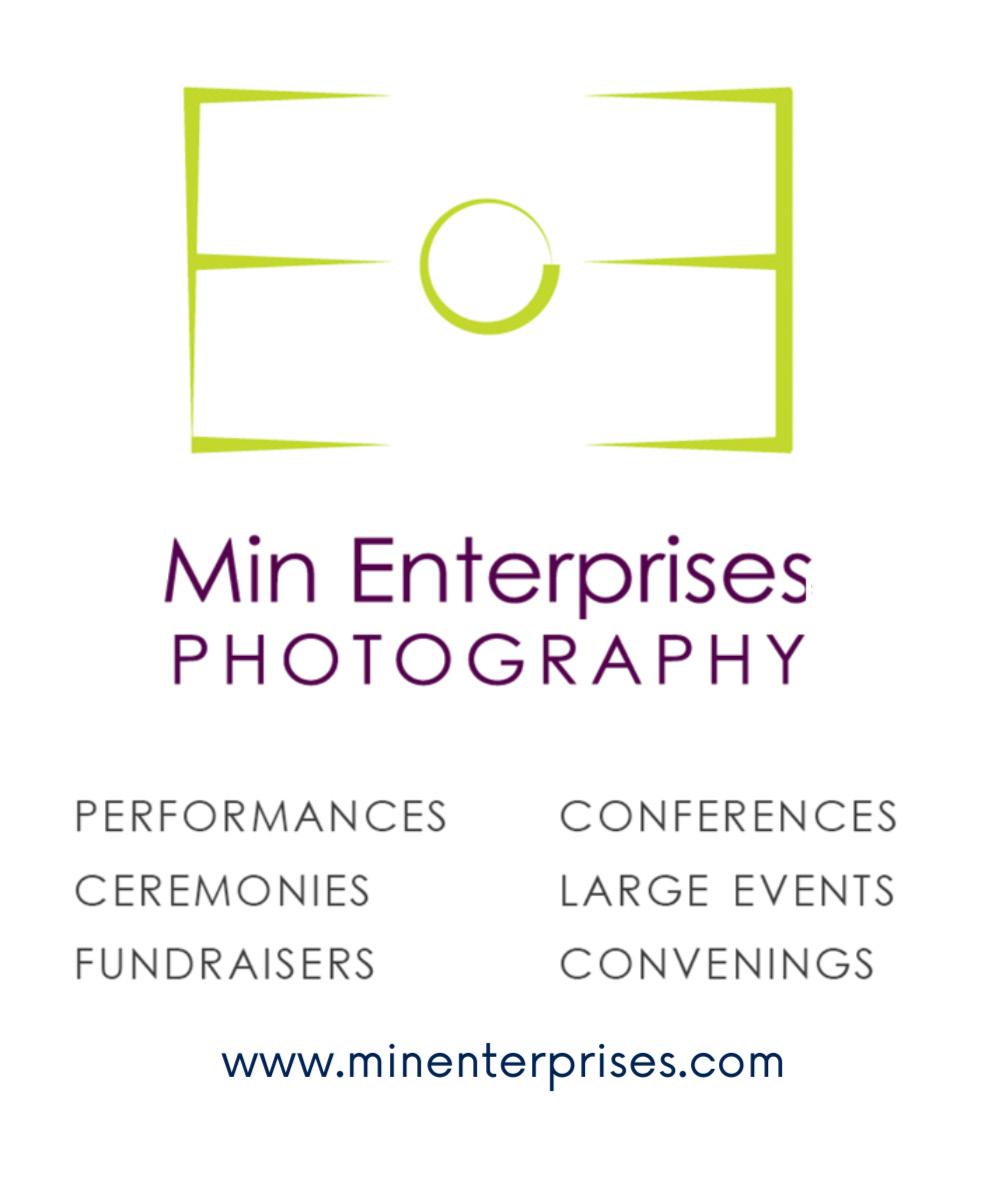
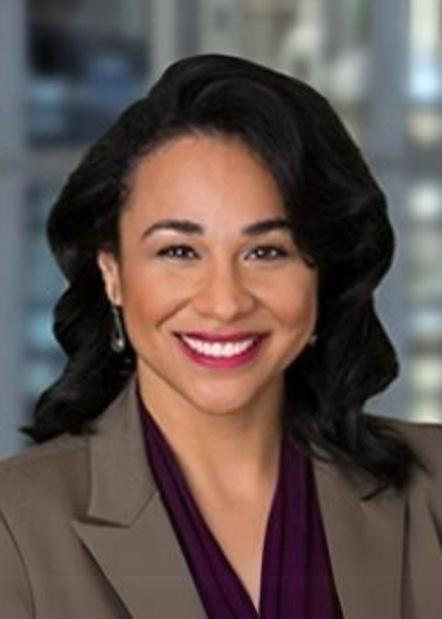
As a child or young adult, what career did you envision for yourself?
As a child I wanted to be an astronaut. Until I discovered there was a minimum height requirement that I did not meet. By the time the height requirement was increased, making me theoretically eligible to be an astronaut, I had my eyes set on being an advocate for those around me.
Describe your career path. When did you begin your legal career? What positions have you held, leading to and including your current job?
As I completed my medical anthropology and public health undergraduate degree at Hampshire College in Amherst, MA, I worked as a study coordinator for medical clinical trials nationally and internationally. I also worked in different capacities with Collective Power for Reproductive Justice (formerly known as the Civil Liberties and Public Policy Program) advocating for reproductive health rights and young people.
I became a high school English teacher in Oklahoma with Teach for America before moving to Minneapolis to complete my Juris Doctor and Masters in Bioethics at the University of Minnesota. I didn’t think I’d stay in Minneapolis after graduating, but life has a funny way of working itself out. After law school, I clerked for the Honorable Patrick D. Robben in Hennepin County District Court. (For those of you considering litigation, I highly recommend clerking after law school!)
I transitioned to private practice in 2018, when I joined Zelle LLP. My practice focuses on insurance coverage and defense, pandemic claims and litigation, commercial and business litigation, and reinsurance disputes. I continue working with Collective Power as one of its Board Members and enjoy mentoring students and bonding with fellow nonnatives in the Twin Cities.
What would you describe as your greatest career success? Your biggest career challenge and how you faced that challenge?
My greatest career success has been reaching a point where I feel confident in my work and have the evidence to show why I can be confident. My biggest career challenge has been balancing my personal life with my work life. I’m better at creating boundaries and sticking to them now, but it’s still a work in progress.
In looking back on your career to date, what advice would you give to a new attorney, or even to your younger self?
Don’t forget to stay true to yourself throughout your legal career. The law isn’t always welcoming of new perspectives, but being authentic truly is an asset. You’d be surprised how refreshing it is to meet someone who is themselves instead of attempting to emulate a generic good lawyer. The latter is easily forgettable, so I encourage all new lawyers to remember to be their authentic selves. And I invite experienced attorneys to create welcoming spaces to allow those authentic personalities to reveal themselves to you.
5. Why did you join MWL? Describe your past and/or current involvement with MWL. What impact has MWL had on you, personally and/ or professionally? Is there a story you can share? (Memorable MWL moment, highlight or impact?)
I joined MWL in law school to meet practicing female attorneys and learn from their experiences. I’m grateful for all the connections I’ve made through the years and for the CLE and learning opportunities the
organization offers.
Given the current state of the profession for women attorneys, what gives you hope? What are best practices or exciting developments you see that have a real impact on creating equity for the diversity of women attorneys across the profession?
It’s inspiring to see more spaces that are actively inclusive. Anyone can add a paragraph on their website saying they support diversity and inclusion, but creating a truly inclusive space is hard. I think it’s great when an attorney, especially one that has been practicing for decades or that is in a position of power, takes the time to find common ground with new hires instead of focusing on how different their backgrounds may be.
What single word or words (1-3) best describe you? Curious, tenacious, and open-minded.
If you could have any career, what would it be? Travel food journalist. I love food and discovering the world. I can’t think of a better way to learn about different cultures.
Favorite travel destination? So far, Singapore.
What’s one thing about you that surprises people? I used to be a fireeater in my college days.
Who has had the greatest impact on your life? My mom. She’s my role model and inspiration. I’m in my 30’s and still aspire to be like her “when I grow up.”
What was your first job? Part-time secretary.
Where is your happy place? The beach, preferably to an ocean.
At what job would you be terrible? Zookeeper. Animals on phone screens are cute, but not my jam in person.
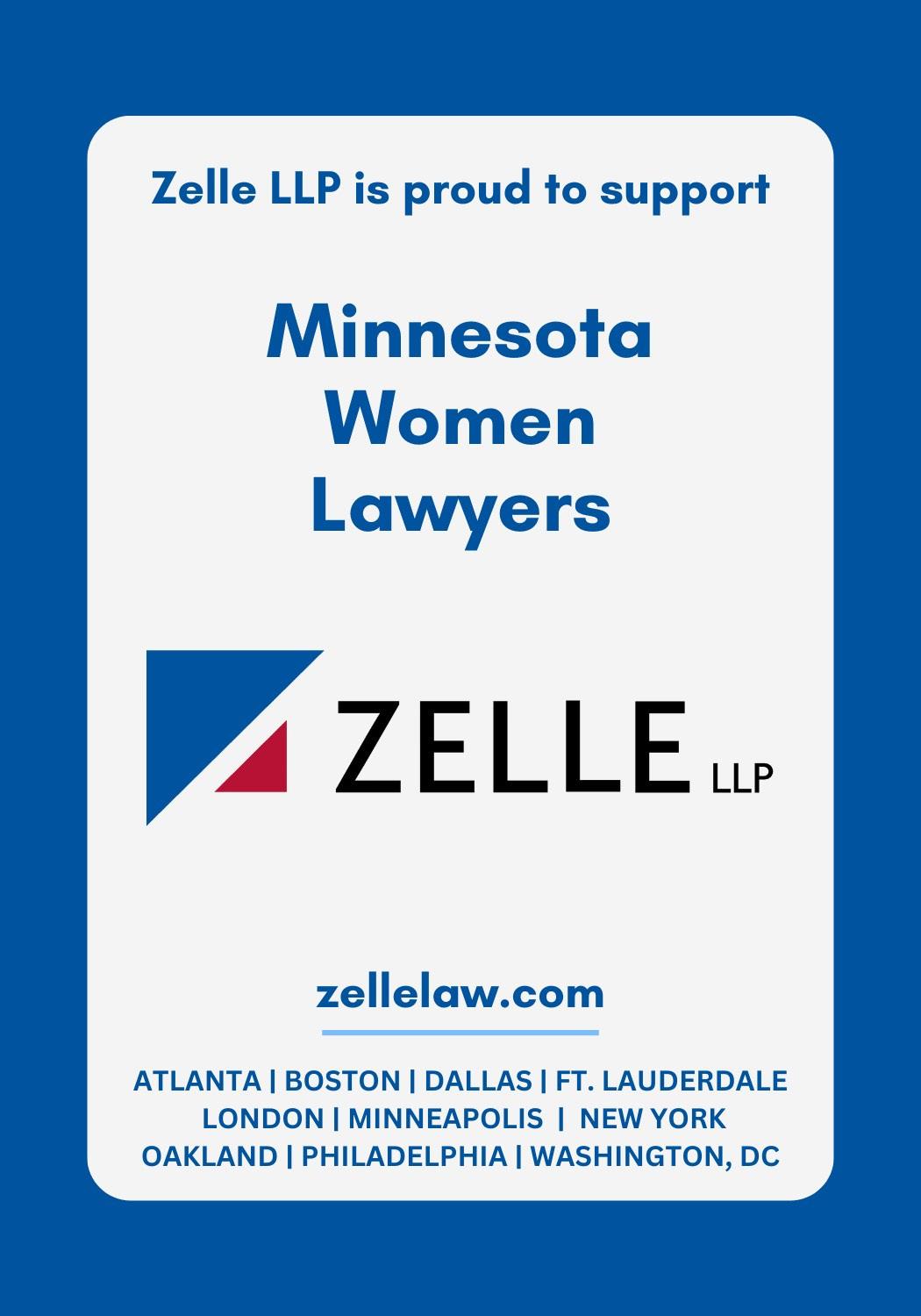
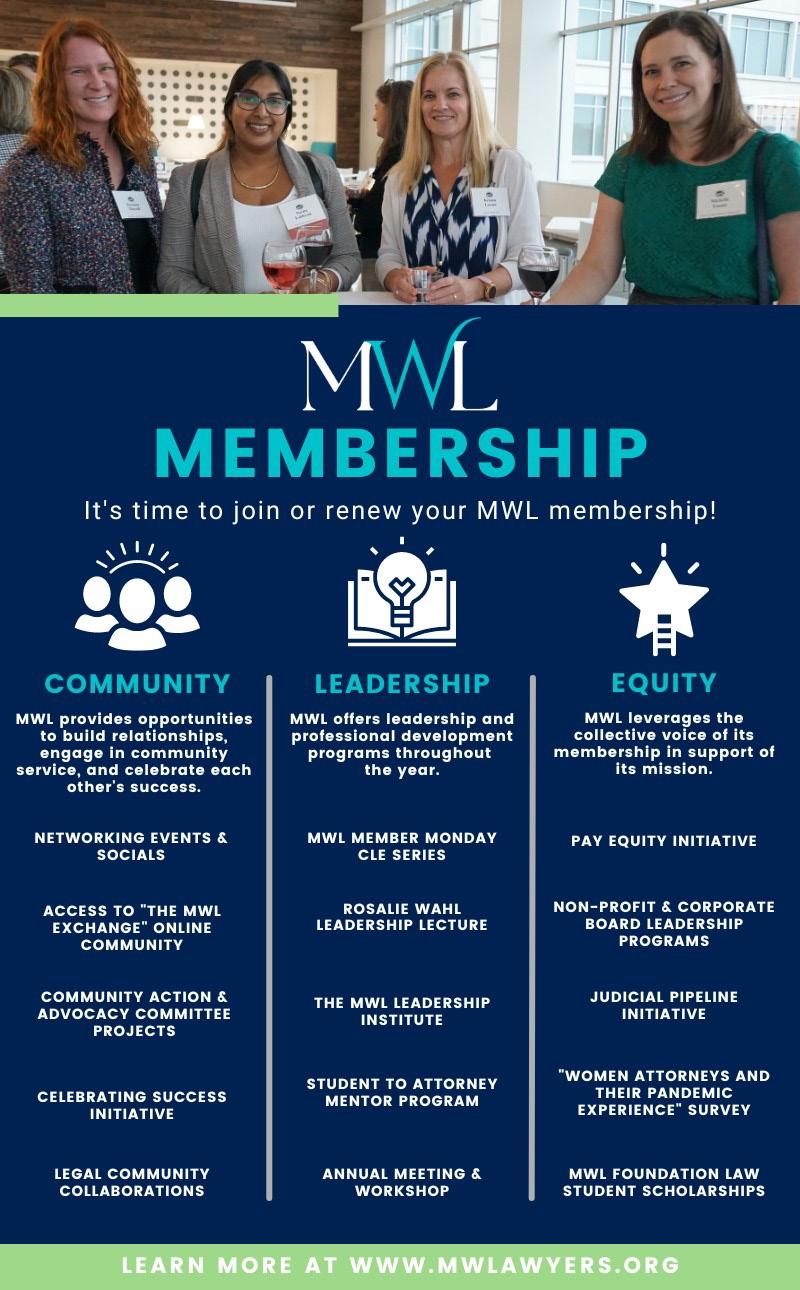
Minnesota Women Lawyers extends sincere thanks to its 2023-2024 Premier Members. A strong Premier Member commitment has been vital to MWL’s success over this past year.
Diamond
Sapphire
Visit our website to view a complete list of MWL’s Premier Members.
Help Us Reach Our 10% Goal: Join MWL as a 2024-2025 Premier Member
Premier Membership allows you to streamline your annual support and enjoy exclusive benefits all year long! Our Premier Members also help make MWL more accessible to all members through their increased support.
This year, our goal is for 10% of MWL”s membership to join or renew as a Premier Member. Learn more at www.mwlawyers.org.
MWL offers its sincere thanks to those who have already renewed or joined as a Premier Member for FY24-25.
A full list of benefits are available at www.mwlawyers.org/premiermembership
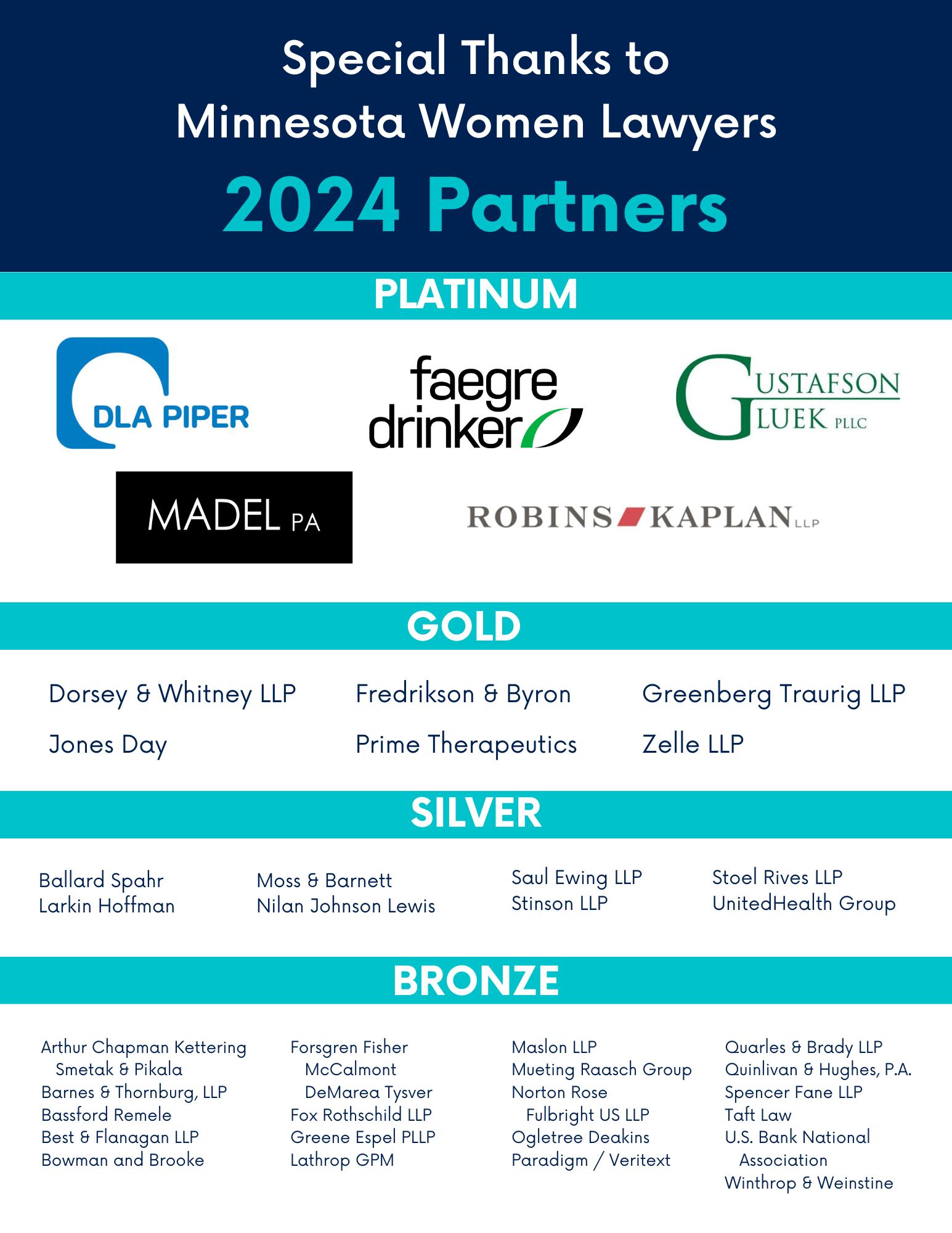
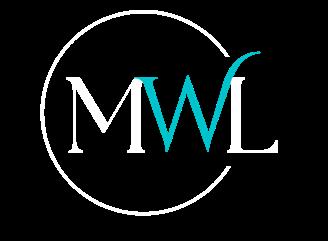
During FY23-24, MWL is pleased to continue offering its monthly CLE series. These programs provide an opportunity for members to engage with one another, learn from legal community leaders, and build connections across the profession. Held either in-person or remotely, most programs have offered CLE credit.
During the second half of the fiscal year, MWL was pleased to present the following programs:
• The CROWN Act: Impact in the Workplace
• Pay Equity for Women of Color Attorneys: Recognizing the Disparities and Working Towards Solutions
• The U. S. Supreme Court’s Decision on Affirmative Action: Impact and the Implications One Year Later
Visit www.mwlawyers.org to learn more about FY24-25 programs.
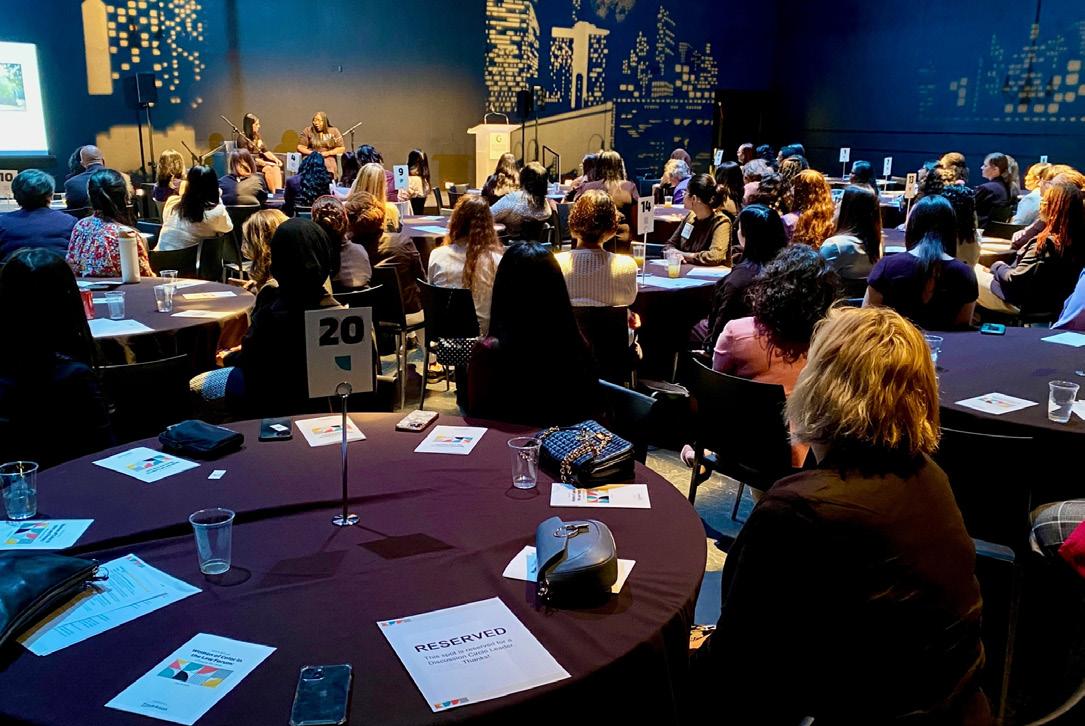
MWL Foundation Launches the Hollins-MatchettMitchell Scholarship
The Minnesota Women Lawyers Foundation is pleased to announce the creation of the Hollins-Matchett-Mitchell scholarship. This $2,500 scholarship will be awarded annually to one woman or nonbinary student of color (self-identified) currently attending a Minnesota law school who has demonstrated a commitment to the advancement of women and/or people of color in the legal profession and/or in the community.
The Hollins-Matchett-Mitchell scholarship honors Athena Hollins and Dana Mitchell, two of Minnesota’s influential women lawyers of color, with generous initial funding from MWL Foundation Board Member Amanda Matchett. The inaugural awarding of the Hollins-MatchettMitchell Scholarship will be in the fall of 2024 at the MWL Rosalie Wahl Leadership Lecture in conjunction with the awarding of the MWL Foundation’s two existing scholarships, the MWL Foundation Law Student Scholarship and the Leslie Altman Memorial Law Student Scholarship.
Specific details and application information for the Hollins-MatchettMitchell Scholarship will be available in August 2024.
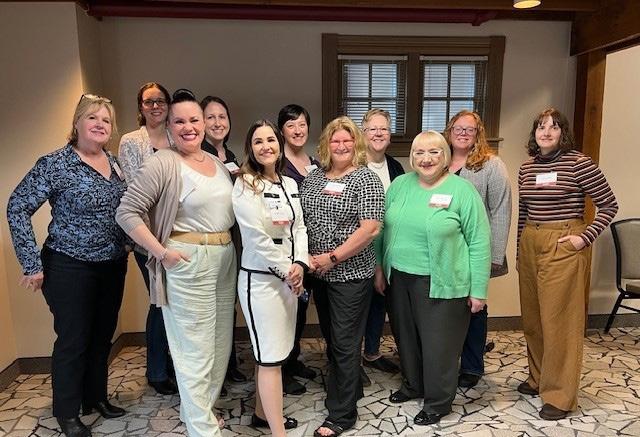
The MWL Solo & Small Firm Practitioner Affinity Group along with the MSBA Solo Small Practice Experience Section and RCBA Solo and Small Firm Section presented the 2024 Solo and Small Firm Summit. This event held on May 2nd at the Heritage Center of Brooklyn Center, allows solo and small firm practitioners to connect with each other and learn from a day of CLE programs.
In conjunction with Fredrikson & Byron PA and Twin Cities Diversity in Practice, MWL co-hosted the Women of Color in the Law Forum on May 29th at the Guthrie Theater. This year’s event featured keynote speaker Ruth Richardson, CEO of Planned Parenthood North Central States. Immediately following Ms. Richardson’s remarks attendees engaged in discussion circles to learn from each other and their shared experiences.
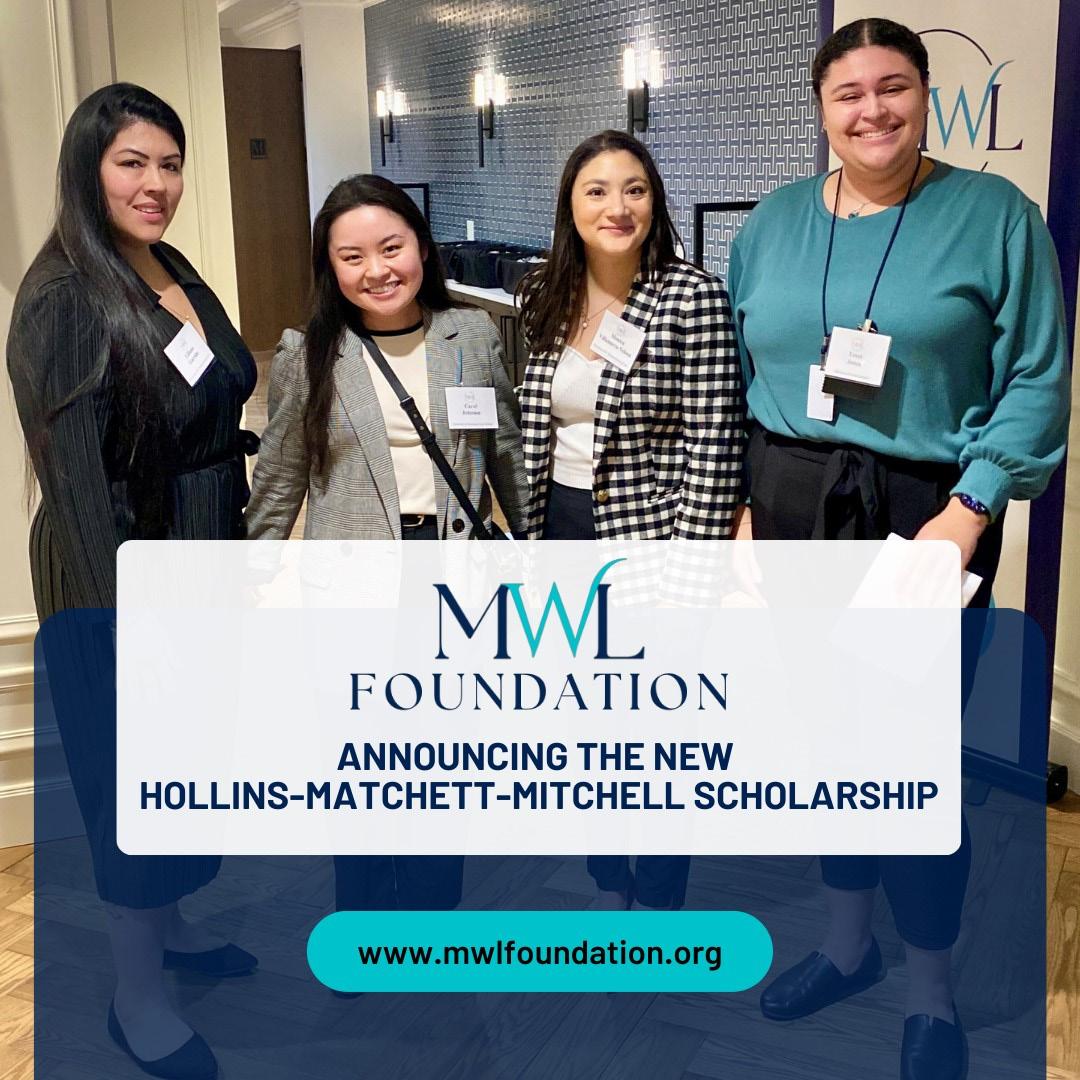

Keynote Address: “Yes, there are miles in front, but what a distance we have traveled.”
By
Chief
Justice Natalie Hudson
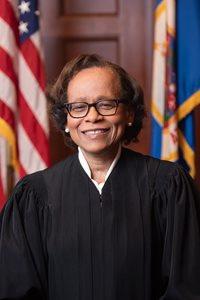
Below are excerpts from Chief Justice Natalie E. Hudson’s Keynote Address: “Yes, there are miles in front, but what a distance we have traveled,” from MWL’s 52nd Annual Meeting held on May 15, 2024.
On the importance of female mentorship
When I entered the profession in 1982, opportunities for women to find mentors and role models were far more limited. But as we all know, the presence of women mentors and role models is invaluable for aspiring attorneys, providing guidance, support, and inspiration as they navigate their careers. And that is why we should all celebrate the smart and talented women who are transforming the ranks of leadership in our state’s legal community. But not only should we celebrate one another, we must – as noted theologian Dr. Renita Weems has said: “care passionately about the quality of another woman’s life.” We still have young women coming into our profession who feel isolated and discouraged. Thus, we need to walk with each other through good times and bad, and take every opportunity to shore one another up so that we each might fulfill our dreams and aspirations. For those of us who have been at this for a while – we may have made it, but we can’t forget to send the elevator back down so that our sisters can make it too!
We just celebrated Mother’s Day and we rightly lifted up the importance of “mothering,” but there’s also – as Dr. Weems says – “sistering”: encouraging one another; promoting one another, stepping back from a speech, a deposition, a mediation, a client meeting – so our younger sisters can get that experience and grow and build their confidence and reputation. And we need to share our disappointments, missteps, and setbacks with our sisters, as readily as we share our successes. Because we know that we learn far more from our setbacks, than we do from our successes. Moreover, we are strengthened by our failures. In some Asian cultures, cracked vases are repaired with melted gold because gold is such a strong metal. As it turns out, the vase is stronger where it has been cracked because of that gold. Our lives are much the same: we are stronger where we’ve been broken, and where we’ve had to repair our lives and get back up.
On the growth of women judges in Minnesota
I’m proud to say that Minnesota was a national leader in changing attitudes toward women in the law. In fact, as I’m sure many of you know, we were the first state in the nation with a female majority on our state supreme court. It may be hard to imagine today, but this was no small story in 1991. The New York Times printed a story under the headline “Women’s Milestone: Majority on Minnesota Court.”
The first paragraph read: “Everyone knows that women are entering the legal profession in record numbers. But no powerful legal institution -- no law school faculty, no large corporate law firm, no appellate court -- has ever been dominated by women. Until now.”
This was a major milestone in our state’s history. And from that moment, we have seen the number of women in the legal
profession – and the number of women serving on the bench – reach numbers that may have been unimaginable in 1991. Back then, women represented just 12% of judges in Minnesota. Ten years ago, women presided in nearly 40% of our state’s courtrooms. Today, 55% of judges in Minnesota are women. This is a reflection of this organization’s commitment to preparing women for the bench, including working with women on the application process; and a commitment by recent governors and the Judicial Selection Commission to a judiciary that is more reflective of the communities it serves.
And once again, in recent years, our very own Minnesota Supreme Court has been a shining example of that progress. For the better part of the past eight years, our court has boasted a female majority. In fact, once our two newest justices - Theodora Gaïtas and Sarah Hennesy – formally join the Supreme Court, Minnesota will have a female majority on its Supreme Court, Court of Appeals, and in the district courts.
We should also celebrate that three out of our five most recent Chief Justices in Minnesota have been women. That includes my predecessor, Lorie Gildea, who retired from the Court last October as one of the longest-serving Chief Justices in Minnesota history. I am also extremely proud to say that with my appointment last fall, Minnesota has its first person of color – its first black woman – as Chief Justice. It is a tremendous honor to carry this legacy forward and to advocate for a more inclusive and equitable legal profession for all Minnesotans.
On improving attorney well-being and the Supreme Court’s new Personal Leave Continuance Rule
I’m sure many of you remember the landmark ABA report released in 2017 that raised major alarms about the crisis of attorney well-being in our country. The study found that between 21 and 36 percent of lawyers qualified as problem drinkers, and more than a quarter struggled with depression.
In response to that troubling study, back in 2019, and then again in 2022, our Court convened a Call to Action for Lawyer Well-Being Event in the Twin Cities. As part of those events, we invited hundreds of
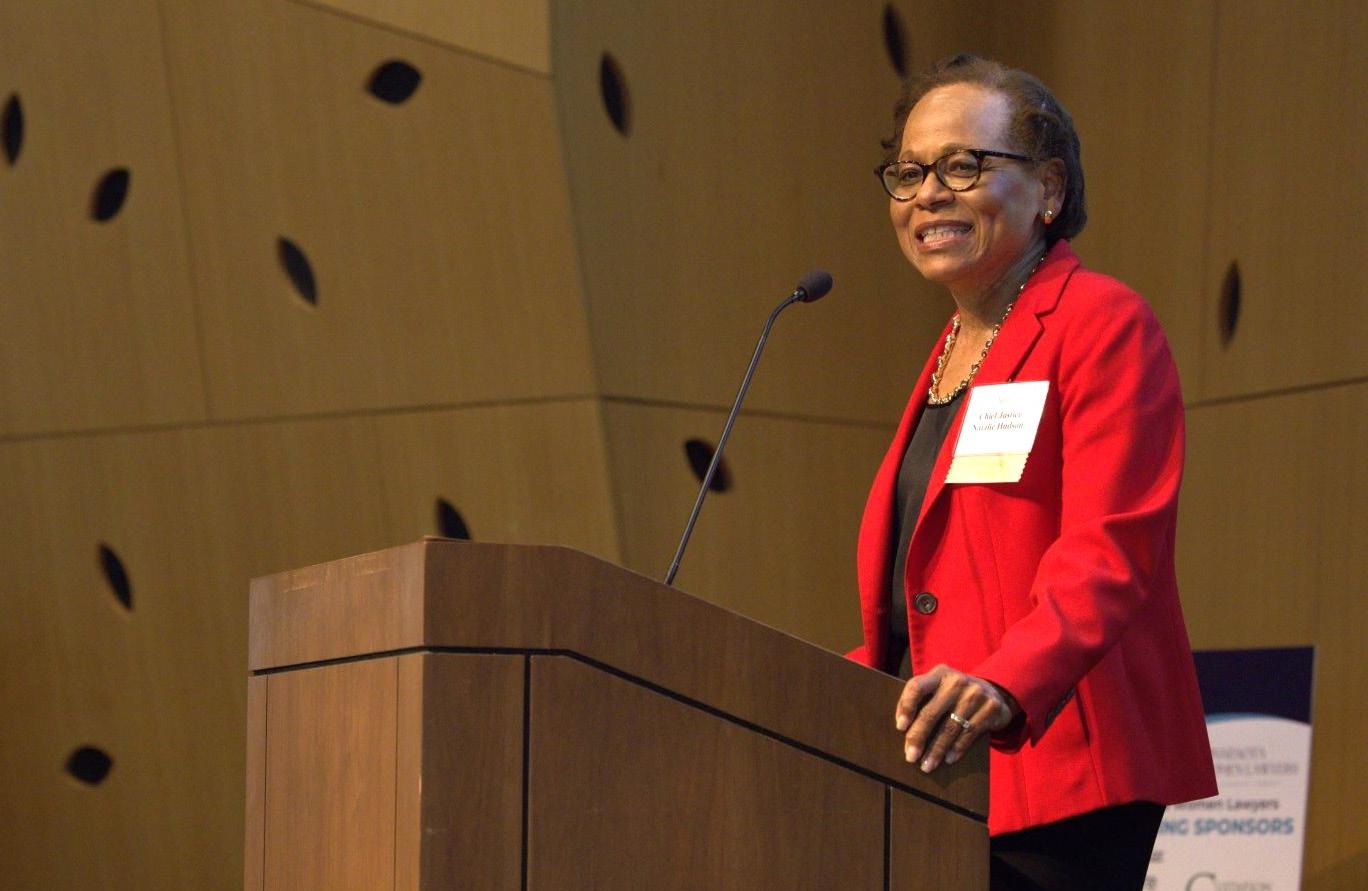

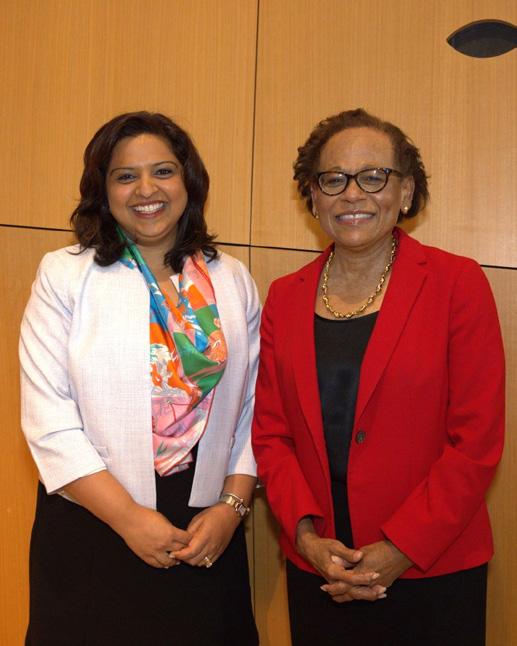
judges, attorneys, and human resources professionals from across the public and private sectors to raise awareness about the crisis of attorney well-being. We also used those events to encourage public and private sector firms to take action to promote lawyer wellness. And with the help of LCL, MSBA and the Federal Bar, we continue to host brown-bag lunches, focusing on various well-being topics. In addition, one of the long-term outcomes from that work was a report issued by the MSBA in 2021, petitioning our state Supreme Court to adopt changes to court rules that would facilitate personal leave requests by attorneys to accommodate the birth or adoption of a child, to take care of a personal or family member’s health condition, or a death in the family.
As the MSBA’s report noted, the absence of such a rule “is detrimental to an attorney’s career…due to the pressure of client development, billable hour requirements, financial incentives, and managing internal and external relationships. The result: Women’s professional careers are negatively impacted when they take leave and men choose not to take leave for fear of its negative impact on their career.”
Our Court was receptive to the MSBA’s request, and between 2022 and 2023, we directed our court rules advisory committees to explore and discuss the MSBA’s petition. We also took written public comments and held a public hearing. And, just two weeks ago, our Court issued an order establishing a two-year pilot applicable in both the district courts and the appellate courts. The pilot will go into effect on September 1, 2024, and will permit a presumptive 90-day personal leave continuance in most civil cases upon an attorney’s declaration and request. This leave could be used for the birth or adoption of a child, to take care of a health condition, to care for a family member, or to address a death in the family.
Opposing parties will have the right to object to a personal leave request, and those objections will be reviewed by the assigned judge. This innovative pilot program represents a proactive approach to ad-
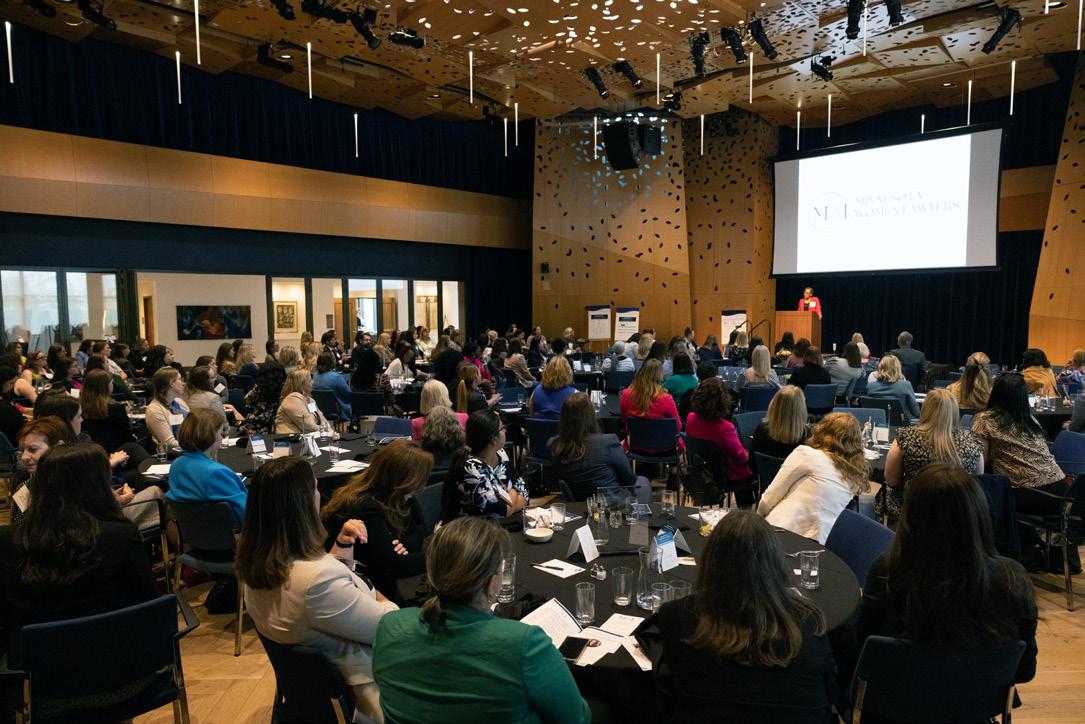
dressing the challenges faced by attorneys in balancing their professional responsibilities with personal obligations. By providing a structured framework for requesting personal leave, the Personal Leave Policy seeks to promote greater flexibility and support for attorneys facing life emergencies or unforeseen circumstances.
Moreover, by acknowledging and addressing the so-called “mommy penalty,” the Minnesota Supreme Court is taking a crucial step toward fostering a more inclusive and equitable legal profession for all practitioners. My colleagues and I on the Court look forward to monitoring the impact of this pilot, and to hearing the feedback from attorneys and judges about how this new personal leave rule works in practice.
CHIEF JUSTICE NATALIE HUDSON: Chief Justice Hudson was appointed to her current position on the Minnesota Supreme Court by Governor Tim Walz on Oct. 2, 2023, having first joined the Supreme Court in 2015, by appointment of Governor Mark Dayton. Prior, she joined the Minnesota Court of Appeals in 2002, by appointment of Governor Jesse Ventura.
Chief Justice Hudson’s previous positions include serving as a staff attorney with Southern Minnesota Regional Legal Services, associate attorney at Robins, Kaplan, Miller and Ciresi, Assistant Dean of Student Affairs at Hamline University School of Law, St. Paul City Attorney, and attorney with the Office of the Minnesota Attorney General. Chief Justice Hudson graduated from the University of Minnesota Law School in 1982.
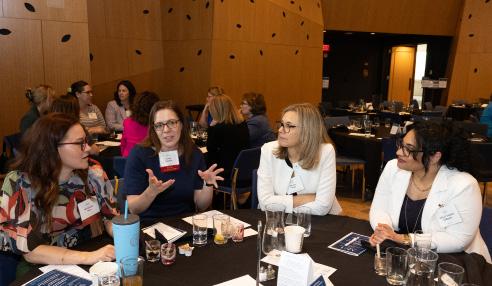
The MWL 52nd Annaul Meeting was held on May 15, 2024 at Westminster Hall in downtown Minneapolis.
The luncheon began with the announcement of MWL’s FY24-25 Board of Directors. This included welcome remarks from FY23-24 President Poonam Kumar, and remarks from FY24-25 President Emerald Gratz.
Immediately following the announcement of new leadership, MWL presented its 2024 Annual Awards. More details about these awards and their winners can be found on page 16.
In keeping with FY23-24 MWL President Poonam Kumar’s theme of “Finding and Using your Voice”, the 52nd Annual Meeting included inspiring remarks from Chief Justice Natalie Hudson of the Minnesota Supreme Court.
Finally, the event concluded with a community discussion surrounding FY24-25 President Emerald Gratz’s theme: “Forging MWL’s Future”.

MWL was pleased to present its 2024 Annual Awards at its 52nd Annual Meeting on May 15th.
The Myra Bradwell Award is presented to an MWL member who expresses the highest ideals of the legal profession and who possesses the qualities exemplified by Myra Bradwell such as courage, perseverance and leadership on issues of concern to women.
From the Award Nomination: Ellen Sampson is the epitome of a leader in the legal community, who has consistently advised, mentored, promoted, and served as a role model for women in the profession locally and nationally.
Ellen chose law as a second career. After graduating from Cornell University with an undergraduate degree in Government, she attended Rutgers and received a Master of Arts in Political Science. Her husband Martin accepted a tenure track professorship at the University of Minnesota, so they moved to the state with their young son Aaron. Ellen worked as a lobbyist for Common Cause/Minnesota, as the assistant and then acting director of the MN Campaign Finance Board, as the Committee Administrator for the House Appropriations Committee, and the Assistant to the Commissioner of Employer Relations for the State of Minnesota, the last three while attending William Mitchell College of Law for 3 and1/2 years in the part time evening program.
Following law school in 1984, she joined the law firm of Pepin Dayton which eventually merged with Leonard, Street and Deinard, now Stinson LLP. She practiced for 38 years in the areas of employment and labor law, government relations, and alternative dispute resolution and was recognized as one of the region’s leading attorneys in employment litigation and mediation. As she began to wind down her practice, she was a highly sought-after mediator and continued to work for a few years after formally retiring from Stinson.
Ellen held numerous leadership roles throughout her career. She served on the firm board of directors and as co-chair of the firm’s pro bono and diversity committees. In the community, in addition to many other roles, she served on the Board of Directors for Women Winning, Board of Trustees at Mitchell Hamline and was chair of the governing council of the labor and employment law section of the Minnesota State Bar Association, receiving its Leonard Lindquist Award. Ellen also served as an adjunct professor at the William Mitchell College of Law. Ellen is an avid supporter of the legal aid and human rights community. She actively represented pro bono clients, was an avid supporter of the Twin Cities legal aid organizations like SMRLS and Advocates for Human Rights and contributed to decades of success at the Deinard Legal Clinic in the Phillips neighborhood of Minneapolis. She also served on
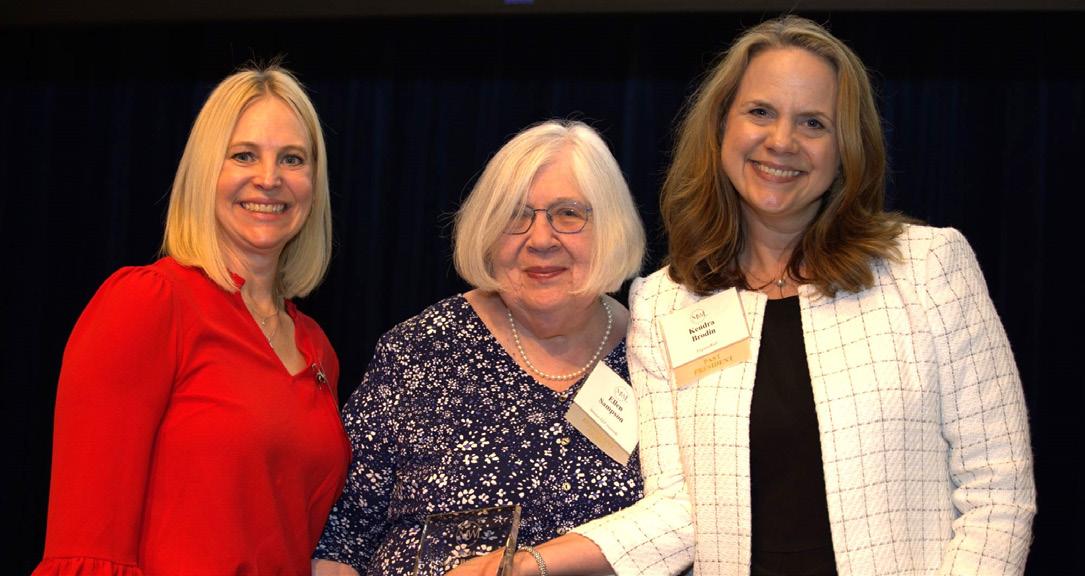
the Board and as co-president of Mt Zion Temple in St. Paul and on the Board and as Vice President of Jewish Family Service of St Paul.
Throughout her life, Ellen has been a wise and formidable advocate for women’s rights and equality. She has devoted countless hours in her life defending, counseling and mediating legal matters pertaining to gender equity and supporting many organizations, including Minnesota Women Lawyers. With this award, MWL was honored to recognize Ellen for her many years of leadership in advancing the success of women lawyers and striving for a just society.
To commemorate its 50th Anniversary in 2022, MWL established the Community Impact Award to recognize those across Minnesota who have made a substantial and positive impact on their communities by inspiring hope; embodying leadership, inclusiveness, and civility; and striving for a just society.
In March 2024, the number of middle school students to graduate from UPLIFT Legal Institute for Teens—a mock trial program for eighth graders reflecting the rich diversity of the Twin Cities—reached 237. Created seven years ago to address the appalling lack of diversity in the legal profession, UPLIFT provides students the opportunity to not only learn about the legal profession, but see themselves in it. Through an after-school program that lasts six months and culminates in a criminal mock trial before an actual judge, UPLIFT students learn from volunteer attorneys and law students about the legal profession, criminal justice, and the court system. By way of the experience, students also build confidence, develop analytical and speaking skills, foster long term vision, and create a framework to pursue academic excellence in high school. In recent years, UPLIFT has offered book clubs, ongoing mentorship, and other enrichment opportunities to its graduates to support their path through high school, on to college, and toward law school.
One of the most powerful aspects of UPLIFT is the mentoring connection that forms between the participants and their coaches—a combination of lawyers from Maslon and the broader legal community, as well as law students. It is perhaps this relational nature of UPLIFT that humanizes and demystifies the practice of law for the middle school student participants, whose previous experiences with and exposure to the law are varied.
“We are unequivocally committed to supporting UPLIFT,” said Keiko Sugisaka, Maslon’s Board Chair. “The integrity of our firm—and the legal profession—rests on our dedication to making the practice of law accessible to those who have historically been excluded from it.”
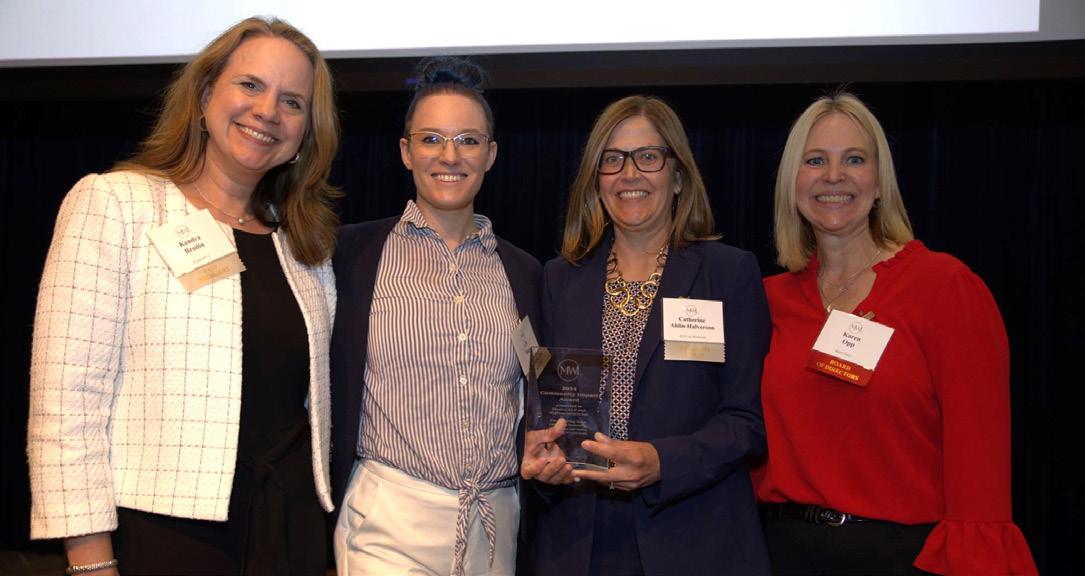

Presented to the Minnesota State Bar Association, with special recognition to Paula Schulze, MSBA Senior Director of Administration
The Service to MWL Award is designed to recognize the MWL member, group of members, organization(s), or other individual(s) whose efforts, during the past program year or over a period of time, have contributed substantially to advance MWL’s mission.
For more than 25 years, the Minnesota State Bar Association (MSBA), and formerly the Hennepin County Bar Association before it merged as part of the Tri-Bar, has not only served as MWL’s landlord, but also as a true advocate and collaborator, supporting the advancement of MWL’s mission in a myriad of ways. Through this foundational relationship, MWL has been “in the bar association mix” for decades, intentionally included by MSBA in countless opportunities for collaboration across the legal community.
With this award, MWL also recognized MSBA Senior Director of Administration Paula Schulze for her tireless dedication to MWL. Paula has served as MWL’s bookkeeper for nearly three decades. But her role has always gone far beyond preparing MWL’s financials. Paula has ensured that MWL is a part of any conversation and decision-making process that may impact the organization. Furthermore, she has ensured
that MWL has the physical, administrative and technological structures necessary to meet its mission. Her support and wise counsel have been invaluable.
As MWL moves to a new office and embarks on a new chapter, MSBA is once again taking MWL along, and providing the organzation with the support necessary for continued success. Given this long relationship, MWL is pleased to publicly recognize and thank MSBA and Paula for the tremendous support and mission-impact.
Congratulations to all 2024 MWL Annual Award recipients.
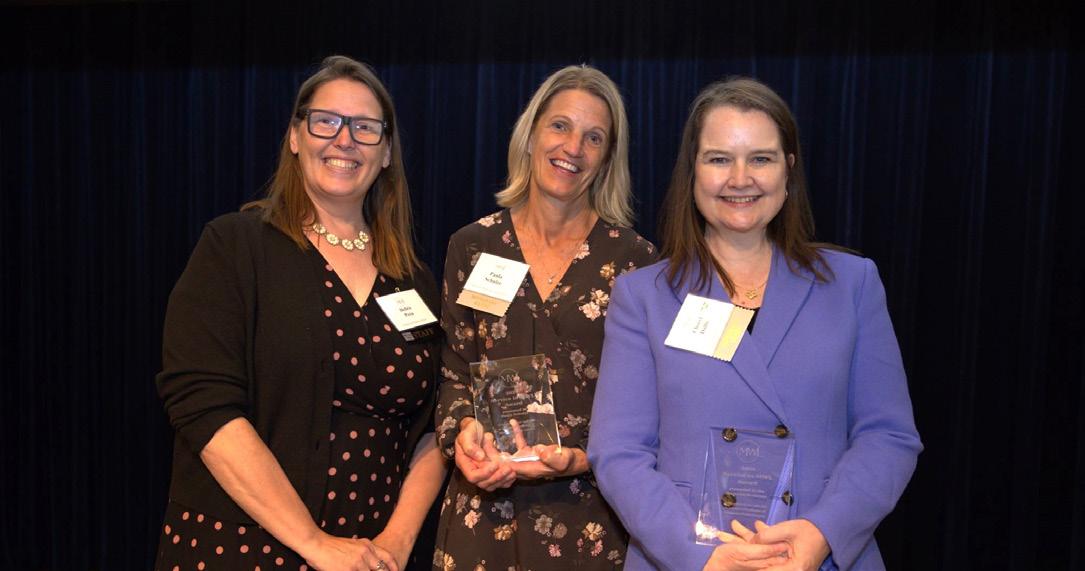
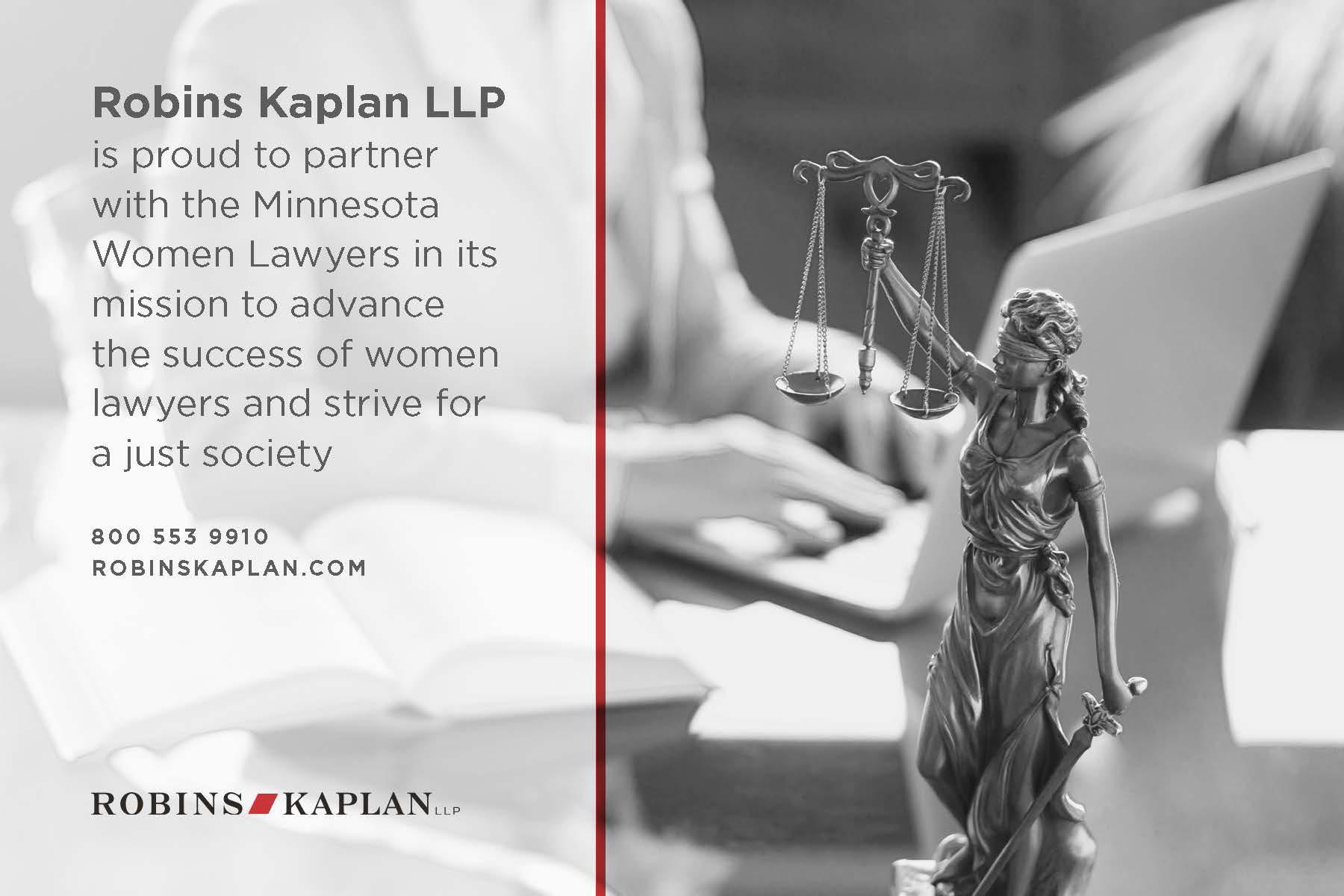
Minnesota Women Lawyer’s Celebrating Success initiative provides a forum to recognize, honor, and celebrate women attorneys who have successes and good news to share. We are interested in hearing about any and all accomplishments – new responsibilities, promotions, leadership positions, awards, new career trajectories, trial wins, professional triumphs, or any other notable news.
Through Celebrating Success, MWL invites the legal community to lift-up and be inspired by our members, as we collectively amplify women’s voices across Minnesota.
The following members have been featured so far:
May 2024
• Elizabeth Bentley, University of Minnesota Law School, Judicial Appointment
• Rebecca Bernhard, Barnes & Thornburg LLP, Joined New Firm
• Angela Brandt, Larson · King, LLP, Trial Victory
• Sarah Soucie Eyberg, Soucie Eyberg Law LLC, New Book Author
• Hon. Theodora Gaïtas, Minnesota Court of Appeals, Judicial Appointment
• Hon. Sarah Hennesy, Seventh Judicial District, Judicial Appointment
• Jessica Klander, Bassford Remele, Promotion
• Katie Lichty, Land O’Lakes, Promotion
• Patience McHenry, University of Minnesota Law School, Award Recipient
• Ellen Sampson, Stinson LLP (ret.), Award Recipient
• Maslon LLP and UPLIFT Legal Institute for Teens, Award Recipient
• Minnesota State Bar Association and Paula Schultze, Award Recipient
• Minnesota Supreme Court, Milestone
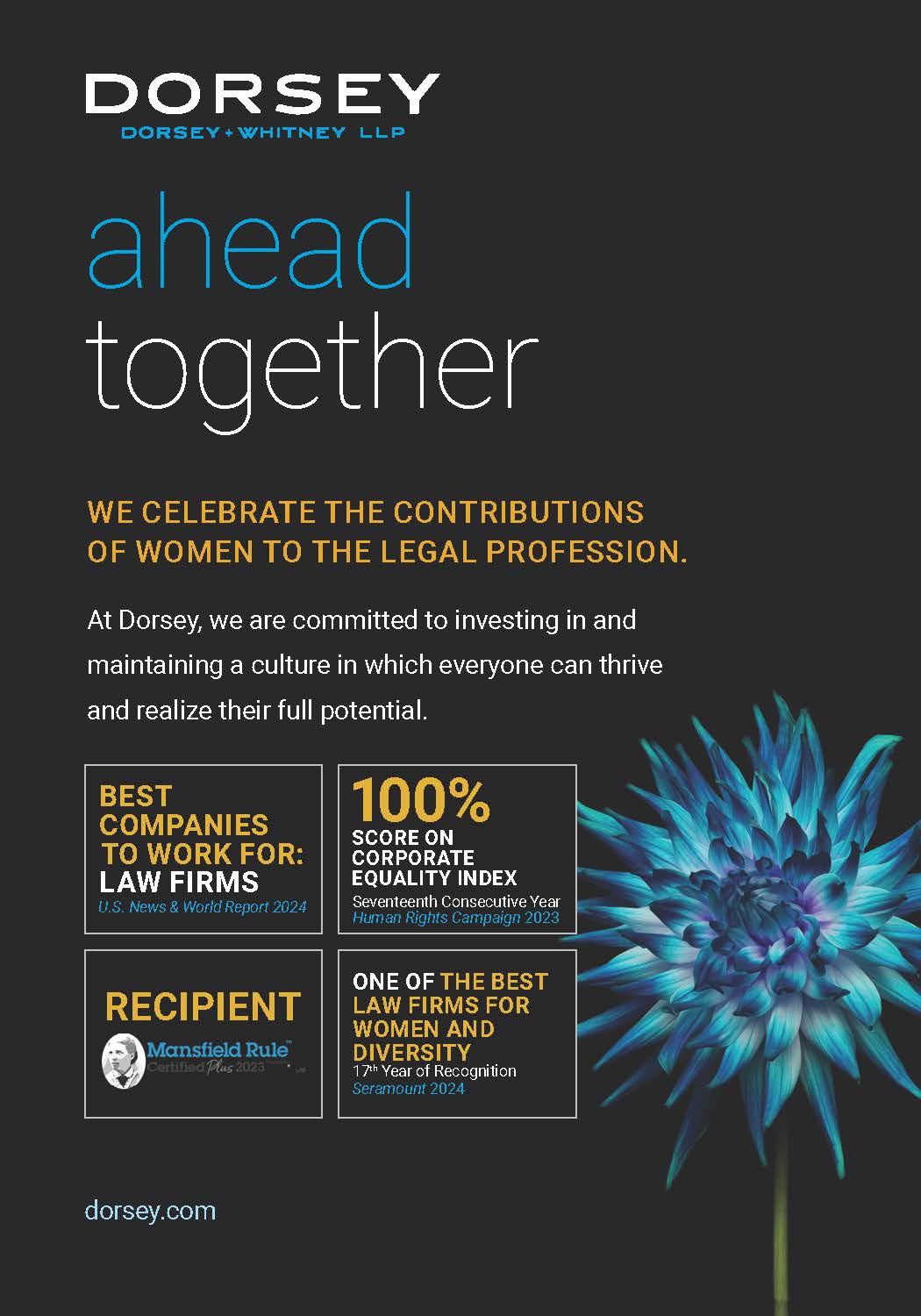
June 2024
• Stephanie Angolkar, Iverson Reuvers, Article Author
• Hon. Leslie Beiers, Sixth Judicial District, Leadership Position
• Kendra Brodin, EsquireWell, Program Launch
• Camille Davidson, Mitchell Hamline School of Law, Milestone
• Hon. Sara Grewing, Second Judicial District, Leadership Position
• Veena Iyer, Immigrant Law Center of Minnesota, Judicial Appoinment
• Susan Mundahl, Mundahl Law, PLLC, New Book Author
• Kristi Paulson, Powerhouse Mediation, Event Speaker
• Melissa Stull, Soule & Stull, Event Speaker
• Ann Thomas, Stinson LLP, Article Interviewee
• Graudating Law Students
July 2024
• Joan Bibelhausen, Lawyers Concerned for Lawyers, Award Recipient
• Rashanda Bruce, Robins Kaplan LLP, Award Recipient
• Emerald Gratz, Minnesota Department of Public Safety, Leadership Position
• Kelsey Kelley, Anoka County Attorney’s Office, Award Recipient
• Amanda Matchett, WorkDay, Scholarship Establishment
• Alona Rindal, Wells Fargo, New Position
• Kari Jensen Thomas, Faegre Drinker Biddle & Reath LLP, Leadership Position
• Cassie Wolfgram, Dougherty, Molenda, Solfest, Hills & Bauer P.A., Leadership Position
• MWL Board of Directors, Leadership Position
• MWL Foundation Board of Directors, Leadership Position
Read about current member successes and learn how to submit your own at www.mwlawyers.org!
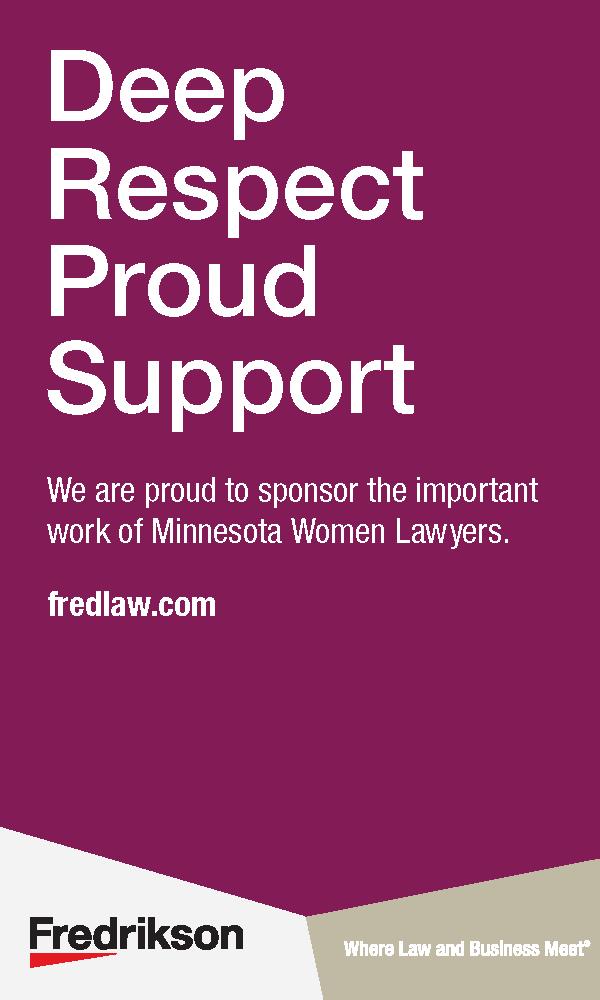
The Central Chapter includes MWL members working or living in the counties of Benton, Douglas, Kandiyohi, Meeker, Mille Lacs, Morrison, Pope, Sherburne, Stearns, Todd.
President: Kimberly Stommes, St. Cloud Public Defender’s Office
Secretary: Heidi Hovis, Minnesota Department of Human Rights
Co-Secretary: Brenda Sletten-Abedi, Board of Public Defense
Treasurer: Ashley Bukowski, Kelm & Reuter, P.A.
MWL Board Liaison: Heidi Hovis, Minnesota Department of Human Rights
The Northeastern Chapter includes MWL members working or living in the counties of Carlton, Cook, Itasca, Lake, Pine and St. Louis.
Chair: Rhonda Degelau, Attorney at Law
Vice President: Angela Ricker, Duluth City Attorney’s Office
Secretary: Kari Peterson, Sixth Judicial District Court
Treasurer: Kay Biga, Spott Law Office
MWL Board Liaison: Linda Tabory, Tabory Law LLC
The South Central Chapter includes MWL members working or living in the counties of Blue Earth, Brown, Faribault, Le Sueur, Martin, Nicollet, Steele, Waseca and Watonwan.
President: Susan Chambers, Attorney at Law, Mediator
Treasurer: Julia Corbett, Blethen Berens
the St. Croix Valley Chapter includes MWL members working or living in Washington and Chisago Counties. The Chapter meets to discuss current legal issues, network, and socialize and hosts volunteer opportunities in the community.
President: Angela Heart, Heart Law, LLC
Vice President: Vicki Hruby, Jardine, Logan & O’Brien
Treasurer: Mackenzie Campbell, Doar Drill & Skow
MWL Board Liaison:: Amy Schmidt, Campbell Knutson, P.A.
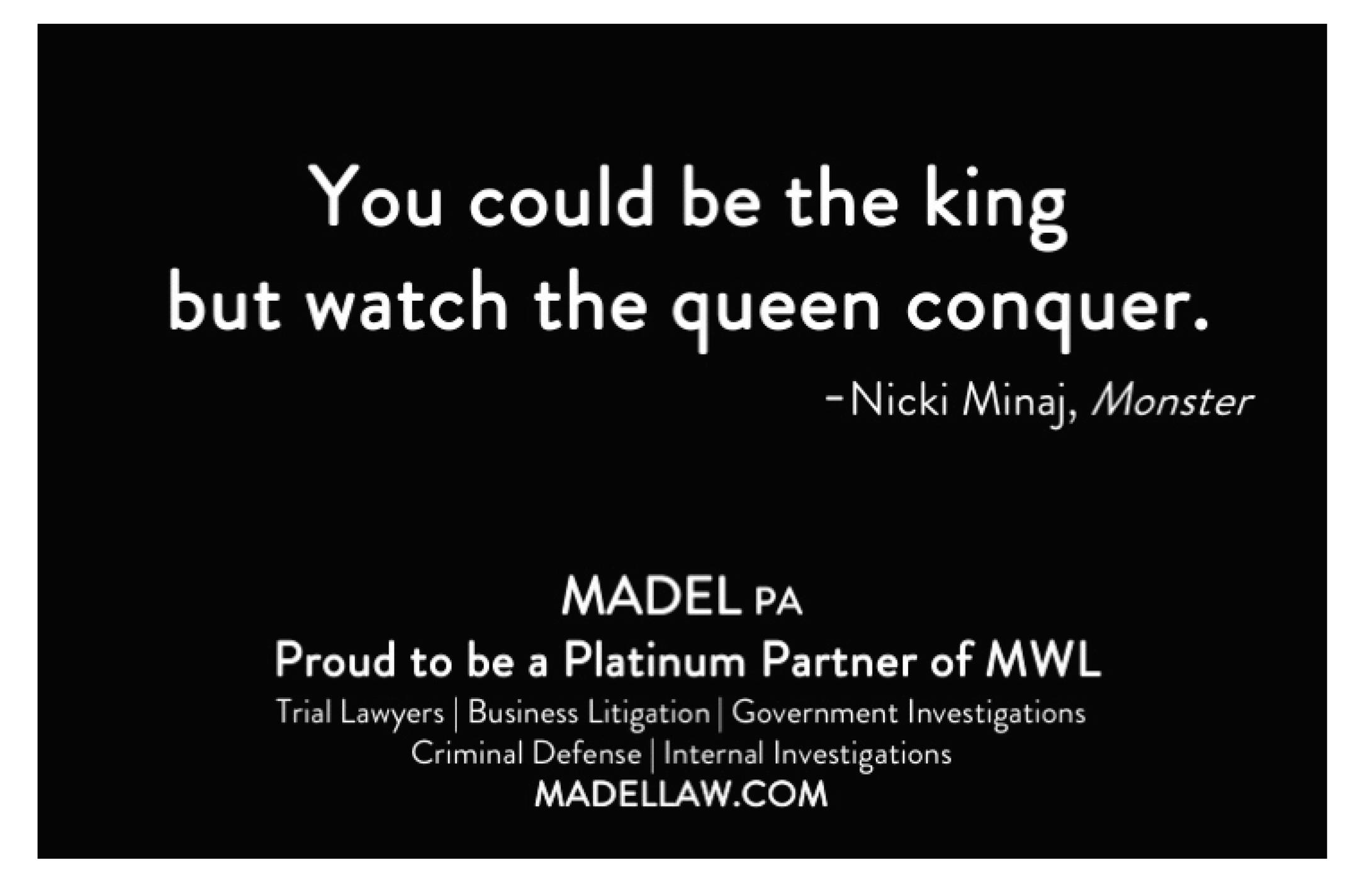
There have always been many ways in which attorneys could use their law degrees. Alternative career paths are becoming increasingly popular and relevant as law school graduates broaden their career options to include non-practice career settings. The MWL Alternative Legal Careers Affinity Group’s goals include: 1) to promote the many career options available to newer and more senior attorneys who choose not to practice but are still law school graduates; 2) to provide professional development opportunities not related to practice but to the broad range of skills and experiences represented by the many alternative career attorneys in MWL, as well as potential members; 3) to create an opportunity to exchange ideas, perspectives, and career options with each other; 4) to validate alternative careers as viable, intentional, and important ways in which an attorney can use her law degree, rather than a secondary, less-preferred option to practicing law; and 5) to provide networking opportunities for alternative career attorneys to get to know new people, connect with existing contacts, and learn about the various ways we are all using our legal education.
Co-Chairs:
Ruth Isaacson, University of Minnesota
Marie Ruzek, Wells Fargo Book Club
The MWL Book Club offers a casual and fun opportunity to meet other MWL members and discuss a book of common interest to the group. When meeting in person, the group enjoys dinner together (payment on your own) and then spends an hour discussing the book selection for the month. RSVP’s are requested (via the MWL Exchange) to get an accurate reservation count at the restaurant.
Co-Chairs:
Karen Bohaty, Attorney at Law
Makenzie Krause, Schaefer Halleen LLC
BWA@MWL:
In support of its mission to advance the success of all women attorneys, MWL members created BWA@ MWL: Black Women Attorneys Affinity Group as an opportunity for its Black women lawyers to connect, gather, flourish and grow. The goal of BWA@MWL is to create a safe space where Black women lawyers can regularly network, discuss issues that impact them and their communities, and collaborate on actionable steps to perpetuate change. Furthermore, BWA@MWL hopes to serve as an MWL touchpoint of welcome for Black women attorney members, both new to the profession and new to Minnesota.
Please Note: BWA@MWL’s activities are currently open to those who identify as Black women. This focus allows the group to create a space that best centers the experience of Black women attorneys and law students.
Co-Chairs:
Deborah Autrey, Nilan Johnson Lewis PA Maliya Rattliffe, Fredrikson & Bryon P.A.
The MWL Creative Collective (formerly known as The MWL Knitting Group) seeks to recognize and foster the creative interests of MWL members, regardless of skill-level, by providing an informal venue to connect with one another, share talents, and engage in creative endeavors together. From knitting, quilting and fiber arts, to painting, photography and poetry, all creative interests are welcome. Group activities may include networkingwhile-creating (e.g. BYO knitting, quilting, drawing, etc.), creating items for donation, and tutorials for members interested in learning new creative skills. Specific activities will be based on participant involvement and interest.
Chair:
Sarah Soucie Eyberg, Soucie Eyberg Law, LLC
The MWL Legal Athletes Affinity Group is a fun and informal way to meet fellow MWL members while breaking a sweat! We create a supportive space for active women and promote a balanced, healthy lifestyle. Depending on the season, our events range from group yoga, spin, zumba, walking, running, rollerblading, golf, racquet sports, and pretty much any other activity where we can get our heart rates up and enjoy some fitness and fun! Formal group gatherings are held quarterly (and may be subject to a small fee, depending on our planned activity and head count), with the option for more informal subgroup meetings weekly for members with access to Lifetime Fitness (or other gym’s based on interest), and members with niche fitness interests. Attendance for group events must be confirmed ahead of time for reservations and planning.
Co-Chairs:
Autumn Gear, Barnes & Thornburg LLP
Lauren Shurson, Mitchell Hamline School of Law
The MWL Legal Wine Lovers consists of members who enjoy tasting and learning more about wine and wine-related topics. Our goals are to increase our wine knowledge, provide educational opportunities by inviting guest speakers who industry experts or leaders, meeting new members using a common interest as the draw, networking, and FUN! Past topics have included: “Know Your Whites,” “Know Your Reds,” “How to Order from a Sophisticated Wine List,” How to Throw a Wine Tasting,” Impressive Yet Affordable Wines,” and “Must-See Stops When Planning a Trip to Wine Country.”
Chair:
Jan Ballman, Paradigm / Veritext
Amy Taber, Attorney at Law
The MWL Professional Parents Affinity Group hosts twice-monthly luncheons, which provide a relaxed environment for MWL’s working parents to meet with one another, network, and share their experiences, challenges and successes, as it relates to their families and their professional careers. Based on member input, upcoming gatherings will feature both focused discussions, as well as more casual opportunities to meet and network with one another, all led by a parenting facilitator. Parents with children of all ages are welcome to attend.
Chair:
Alona Rindal, Wells Fargo
The MWL Rainmakers Affinity Group seeks to create community for attorneys and legal professionals who seek to build and hold wealth through business origination. The group will meet remotely once a month (date and time TBD) to discuss topics of common interest. MWL members from all types of legal careers are welcome to participate.
Chair: Cody Blades, Parker Daniels Kibort, LLC
Join other MWL members who are solo and small firm practitioners to discuss issues of common interest. Meetings are held on the first Friday of each month (second Friday on holiday weekends) from 9:30 a.m. to 11:00 a.m.
Co-Chairs:
Chris Courtney, Courtney Law Office
Mary Szondy, Attorney at Law
The Public Sector Affinity Group and the RISE: Emerging Lawyers Affinity Group are currently inactive, awaiting members to step forward into the Chair/Co-Chair role. If you are interested in helping to lead these affinity groups, please contact Membership & Communications Coordinator, Katie Gunaratne (kgunaratne@mwlawyers.org) for more information.
The purpose of the Awards and Recognition Committee is to honor, lift-up, recognize and celebrate individuals, as well as entities and legal employers, who 1) represent the highest ideals of the legal profession; 2) enhance the status, influence and effectiveness of women lawyers; and/or 3) simply have good news to share, particularly as it relates to advancing MWL’s mission. To that end, the Committee leads MWL’s “Celebrating Success” initiative, and administers MWL’s Community Impact, Leadership and Myra Bradwell Awards which are presented annually at the organization’s Annual Meeting. The Committee may also identify and submit award nominations to external organizations and entities on behalf of MWL and its members, as well as offer recommendations on other recognition efforts.
Co-Chairs:
Kendra Brodin, EsquireWell
Karen Opp, Korn Ferry
The Community Action & Advocacy Committee facilitates greater community service and public policy programming and activities as defined by MWL’s mission and values, and approved by the Board. Current focus areas include: 1) violence against women; 2) pay equity; 3) access to justice; and 4) girl empowerment. Activities may be coordinated in conjunction with other associations, professional groups and organizations, both within and outside of the legal community.
Co-Chairs:
Kelsey Kelley, Anoka County Attorney’s Office Nicolet Lyon, Ronstadt Law
Guided by MWL’s Diversity, Equity and Inclusion Statement the DE&I Committee leads MWL’s related efforts by identifying and developing specific goals and initiatives to advance diversity, equity and inclusion, both internally and outward-facing. Subsequently, the DE&I Committee communicates MWL’s goals to all other MWL leadership groups and provide support to ensure each groups’ related efforts and implementation. Furthermore, the DE&I Committee develops and/or review MWL’s DE&I goals each year and takes a leadership role in implementation over the course of the fiscal year.
Co-Chairs:
Molly Hough, Prime Therapeutics
Jenny Robbins, MADEL PA
The MWL Equity Committee oversees initiatives aimed at the systemic advancement and success of women attorneys. Current activities include attaining non-profit and corporate board positions, specific practice area pipeline projects (judicial, firm, corporate, etc.), further development of MWL’s Pay Equity initiative, and other efforts in support of MWL’s Strategic Plan. The Pay Equity Initiative promotes and advocates for equal pay for women and diverse/underrepresented attorneys across the legal profession. This includes ensuring pay equity for similarly situated positions and promoting women and diverse/underrepresented attorneys to higher levels of leadership and responsibility within their organizations. Occasionally, the Equity Committee reviews, researches, and makes recommendations to the Board regarding policy or related issues impacting the equitable position of women attorneys in the legal profession.
Co-Chairs:
Amy Boyle, MSB Employment Justice
Kelly Clark, Heinz Law
Angela Keise, Minnesota Attorney General’s Office
Elizabeth Patton, Fox Rothschild LLP
The Membership and Engagement Committee implements best practices for increasing MWL membership through its recruitment and retention efforts, with an emphasis on welcoming members with diverse backgrounds, identities, experiences and viewpoints. Furthermore, the Committee’s efforts enhance and deepen engagement between MWL and its members, by promoting and connecting members to MWL’s many offerings, member benefits, volunteer opportunities and leadership roles.
Co-Chairs:
Cody Blades, Parker Daniels Kibort
Sarah Soucie Eyberg, Soucie Eyberg Law, LLC
Kayla Kienzle, Nichols Kaster, PLLP
The CLE & MMM (MWL Member Monday CLE Series) Committee coordinates specific professional development and leadership events that support women attorneys in: 1)addressing issues of bias and inequity within the profession; 2)developing core competencies; 3) building skills and expertise within specific legal/practice areas; 4) developing leadership skills; attaining leadership positions outside of the legal community; 5) developing and supporting mentoring relationships
Co-Chairs:
Allison Cole, Chestnut Cambronne PA
Andrea Hoversten, Geraghty O’Loughlin & Kenney
Chelsea McLean, Dorsey & Whitney LLP
The Signatures and Socials Committee assists in planning key MWL events and socials, including the Rosalie Wahl Leadership Lecture, the MWL Annual Meeting & Workshop, the MWL President’s Reception, the Winter Social, and the Spring Social. The committee fosters a welcoming environment within MWL, providing opportunities for members to develop connections. Activities include developing event themes, securing speakers, coordinating logistics and volunteers, promoting publicity, and facilitating colleague connections.
Co-Chairs:
Kelly Lelo, Snodgrass Law
Lisa Lodin, Minnesota Attorney General’s Office
Cassie Merrick, MADEL PA
The Publications Committee is responsible for developing and coordinating MWL’s bi-annual publication With Equal Right, ensuring its content and format reflects MWL mission and values, and supports MWL’s strategic objectives and goals.
Co-Chairs:
Kristen Larson, Ballard Spahr LLP
Jennifer Moreau, Minnesota Attorney General’s Office
• FY24-25 Member Monday CLE Series
• Women of Color in the Law Fall Gatherings
• 30th Annual Rosalie Wahl Lecture
• MWL Foundation Scholarships
• Social Justice Writing Award
• Student to Attorney Mentor Program
• And so much more!

Our Mission
Incorporated in 1972, Minnesota Women Lawyers is an association of more than 1200 attorneys, judges, law students and legal employers, dedicated to advancing the success of women lawyers and striving for a just society.
Our Values
Through our efforts, MWL promotes equity and inclusion within the legal profession and beyond; develops and supports women lawyers as leaders; and engages and celebrates a diverse community.
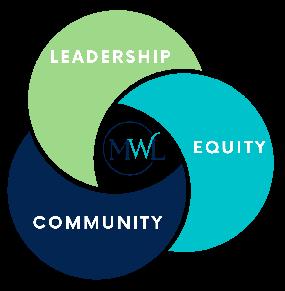
Poonam Kumar, 2023-2024 MWL President poonam.kumar@us.dlapiper.com
Emerald Gratz, 2024-2025 MWL President emerald.gratz@state.mn.us
Debra Pexa, Executive Director dpexa@mwlawyers.org
Katie Gunaratne, Membership & Communications Coordinator kgunaratne@mwlawyers.org
Tessa Jones, Program & Projects Coordinator tjones@mwlawyers.org
33 South Sixth Street, Suite 4540
Minneapolis, MN 55402 (612) 338-3205